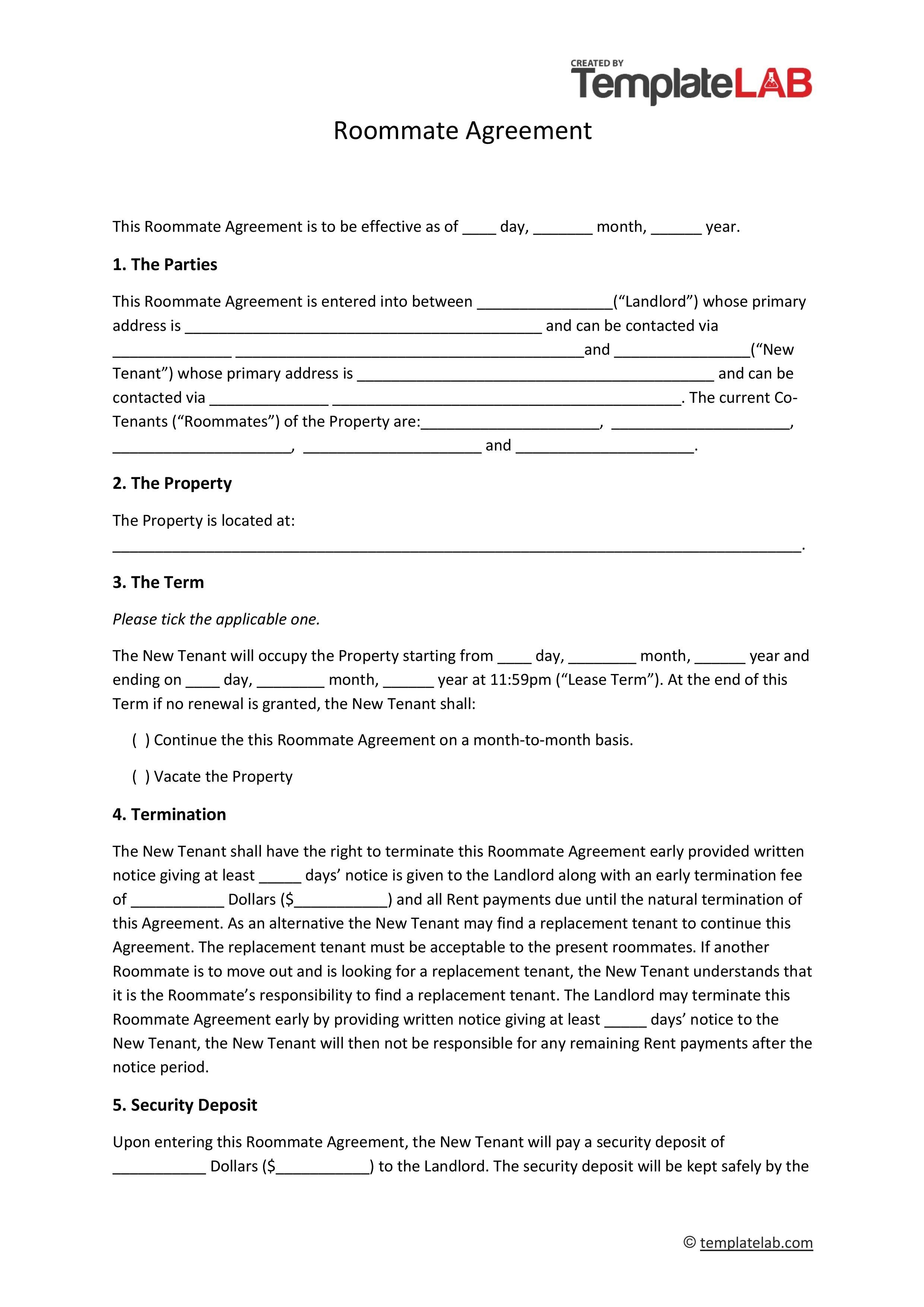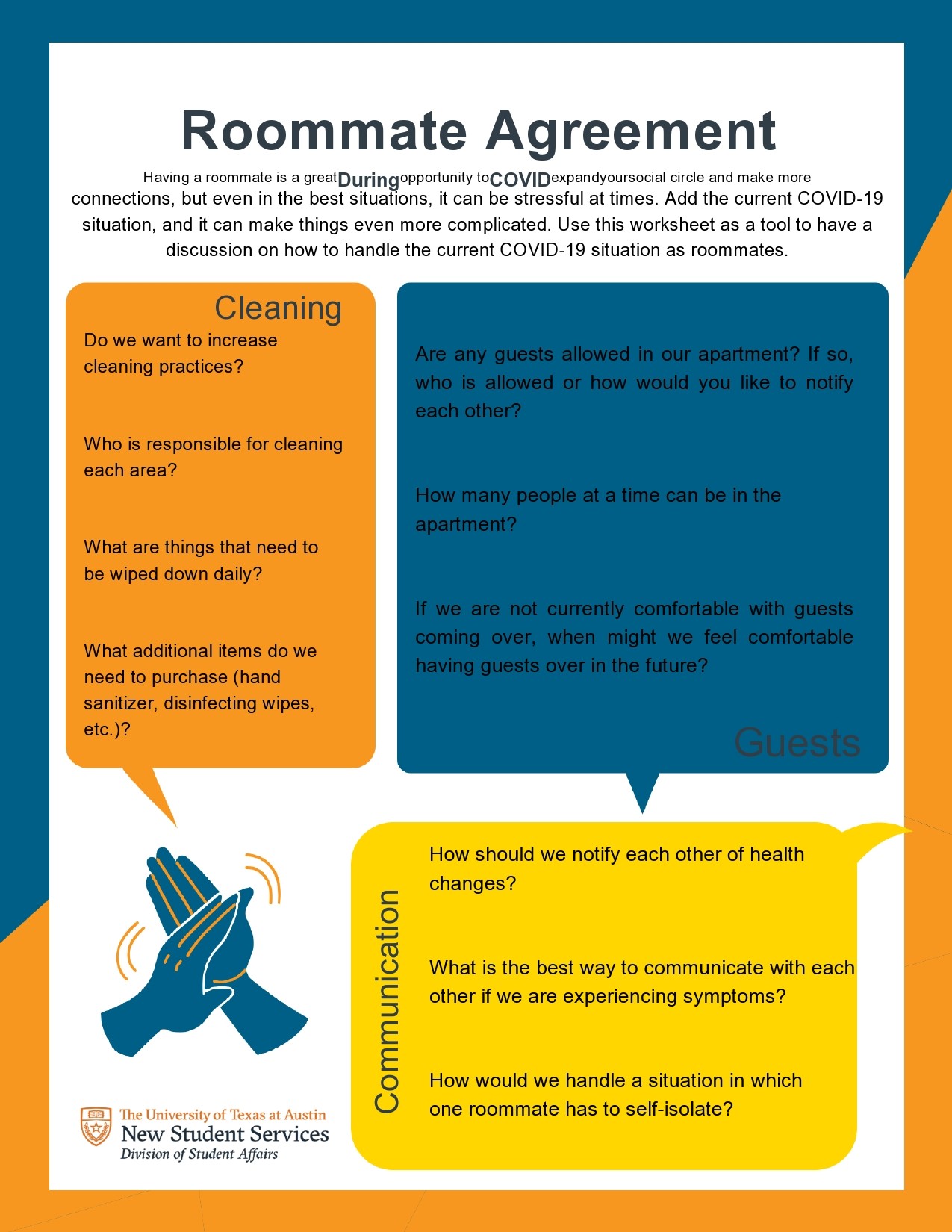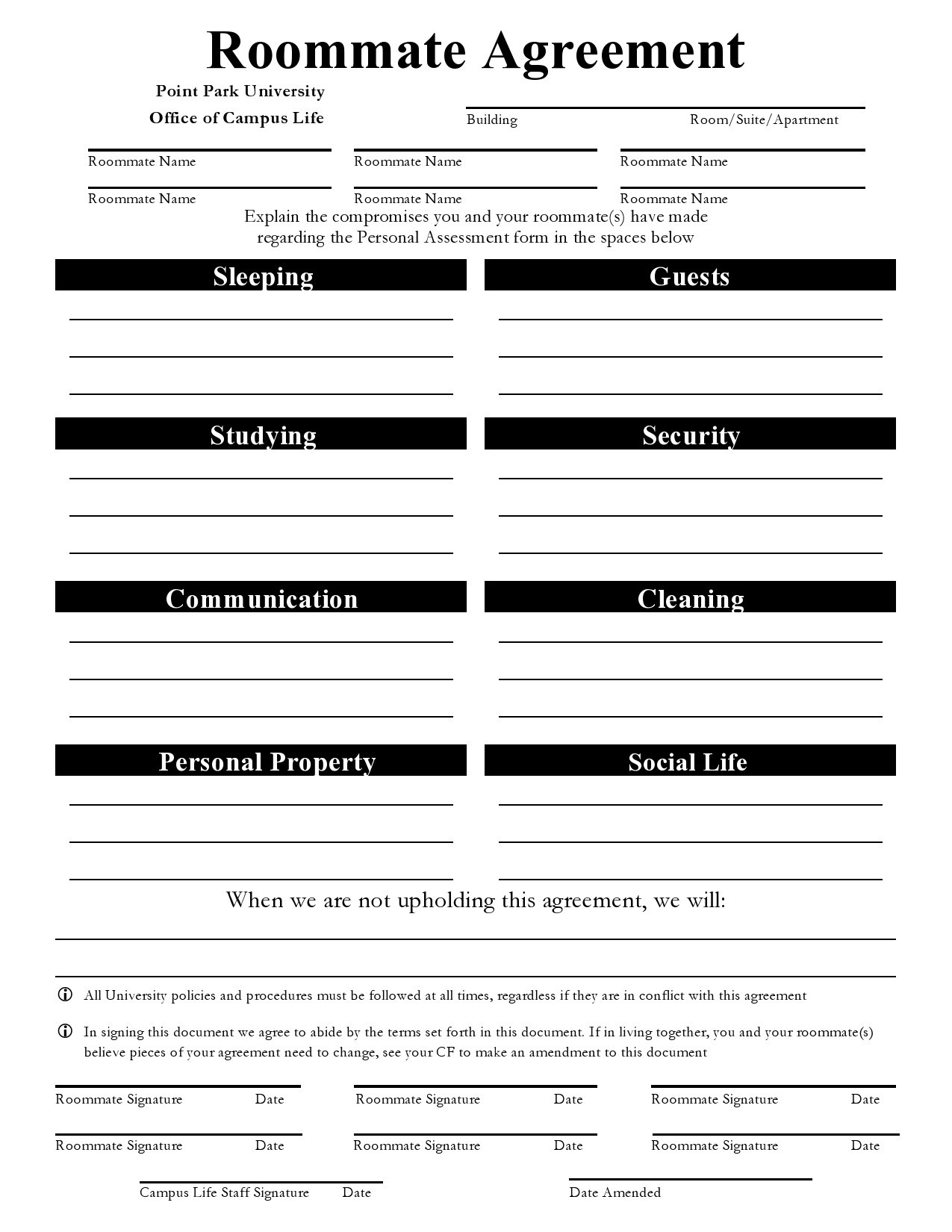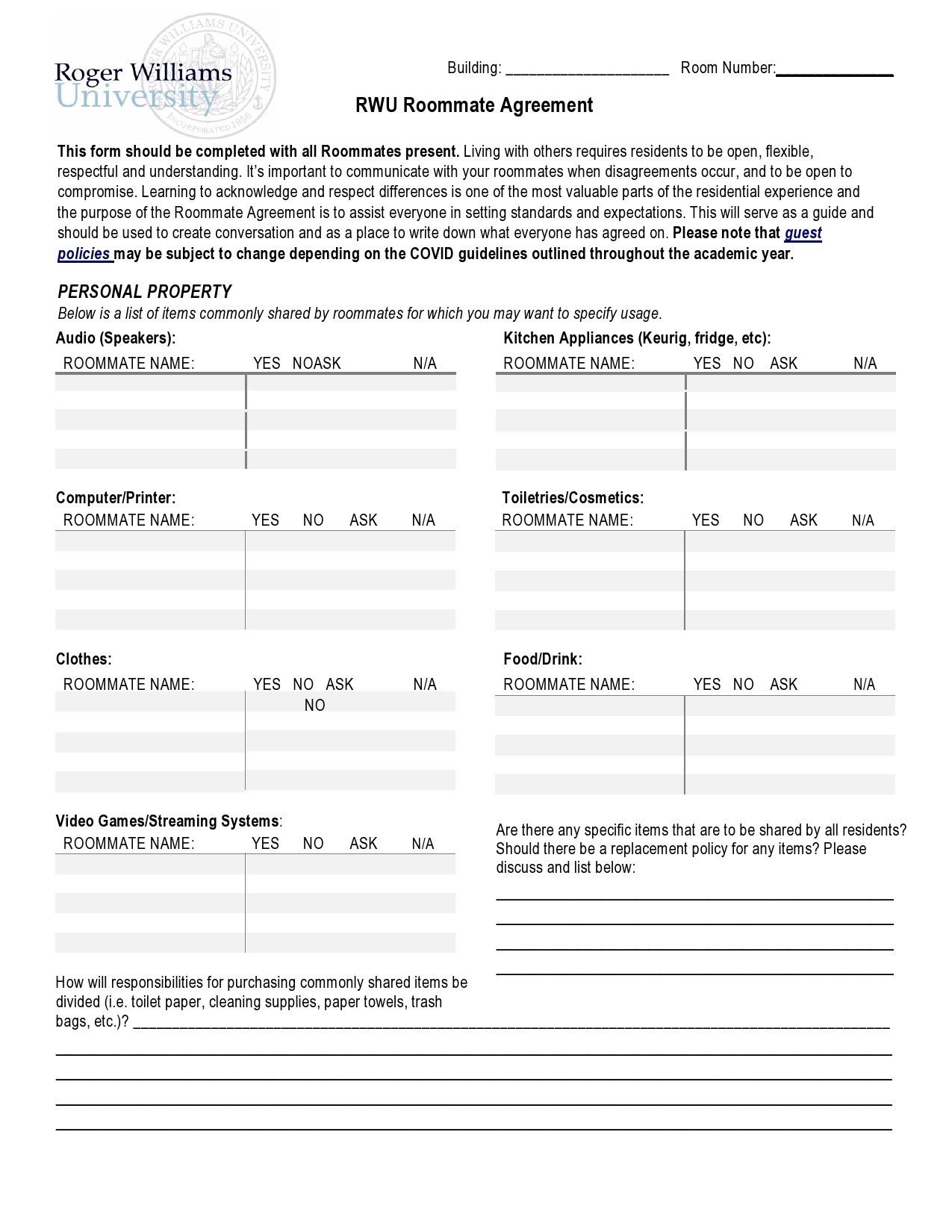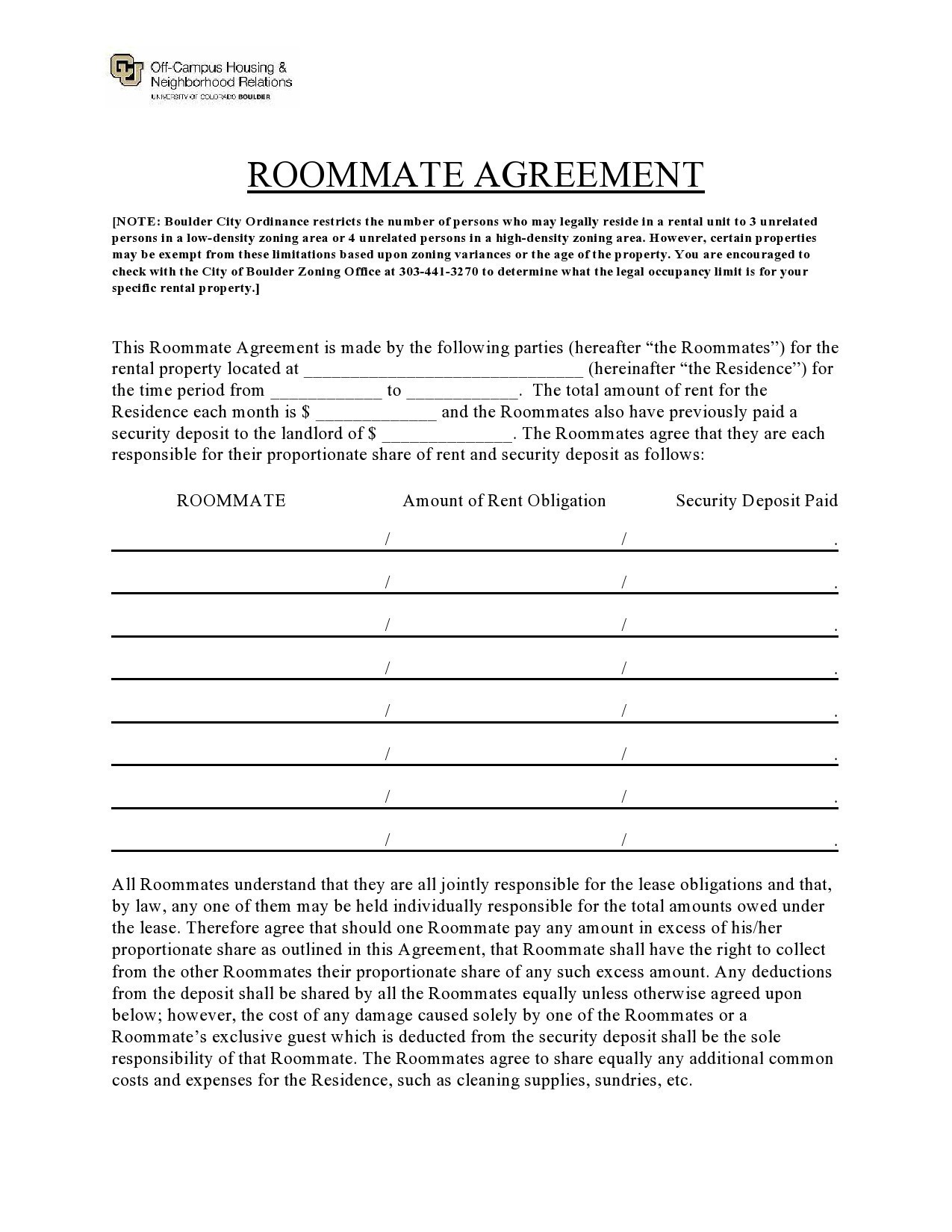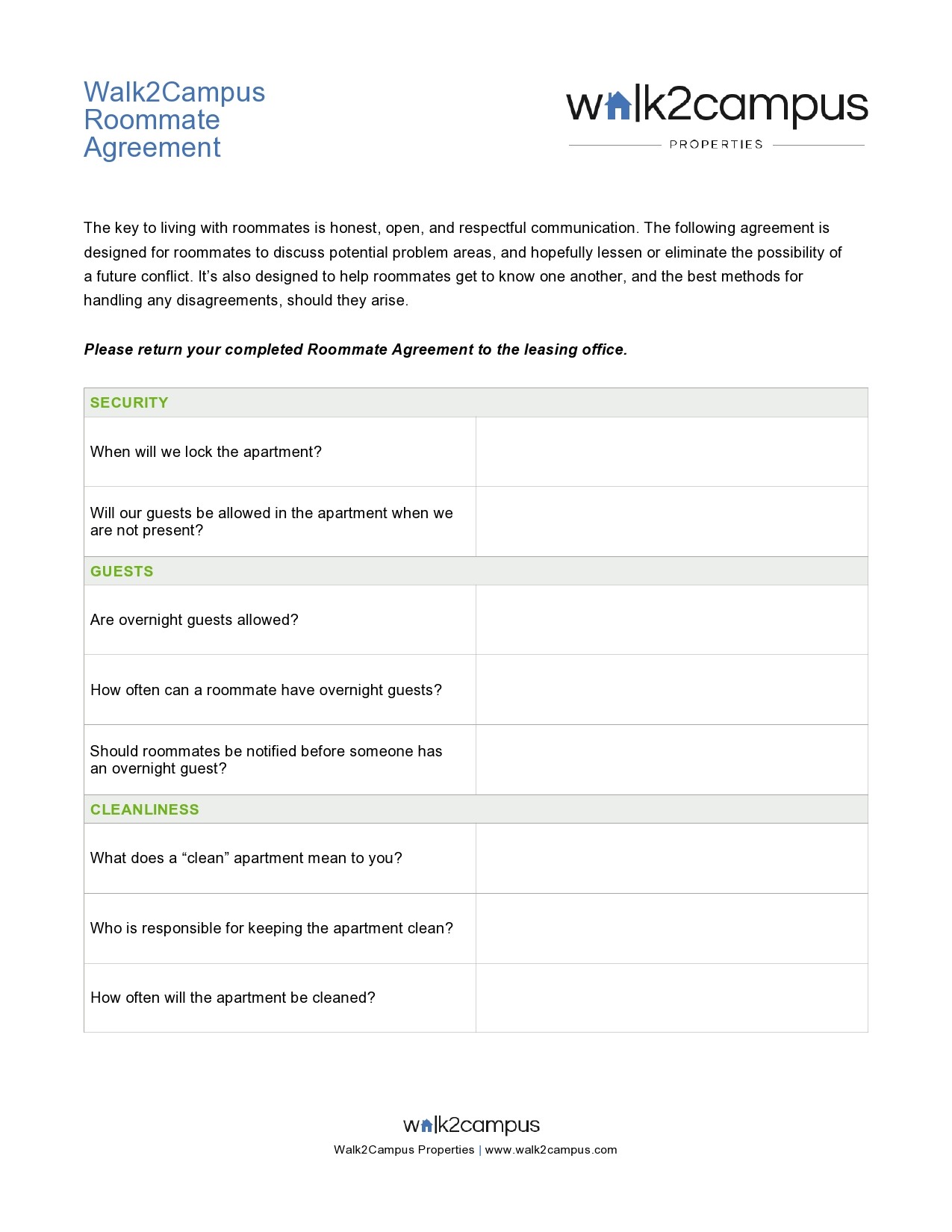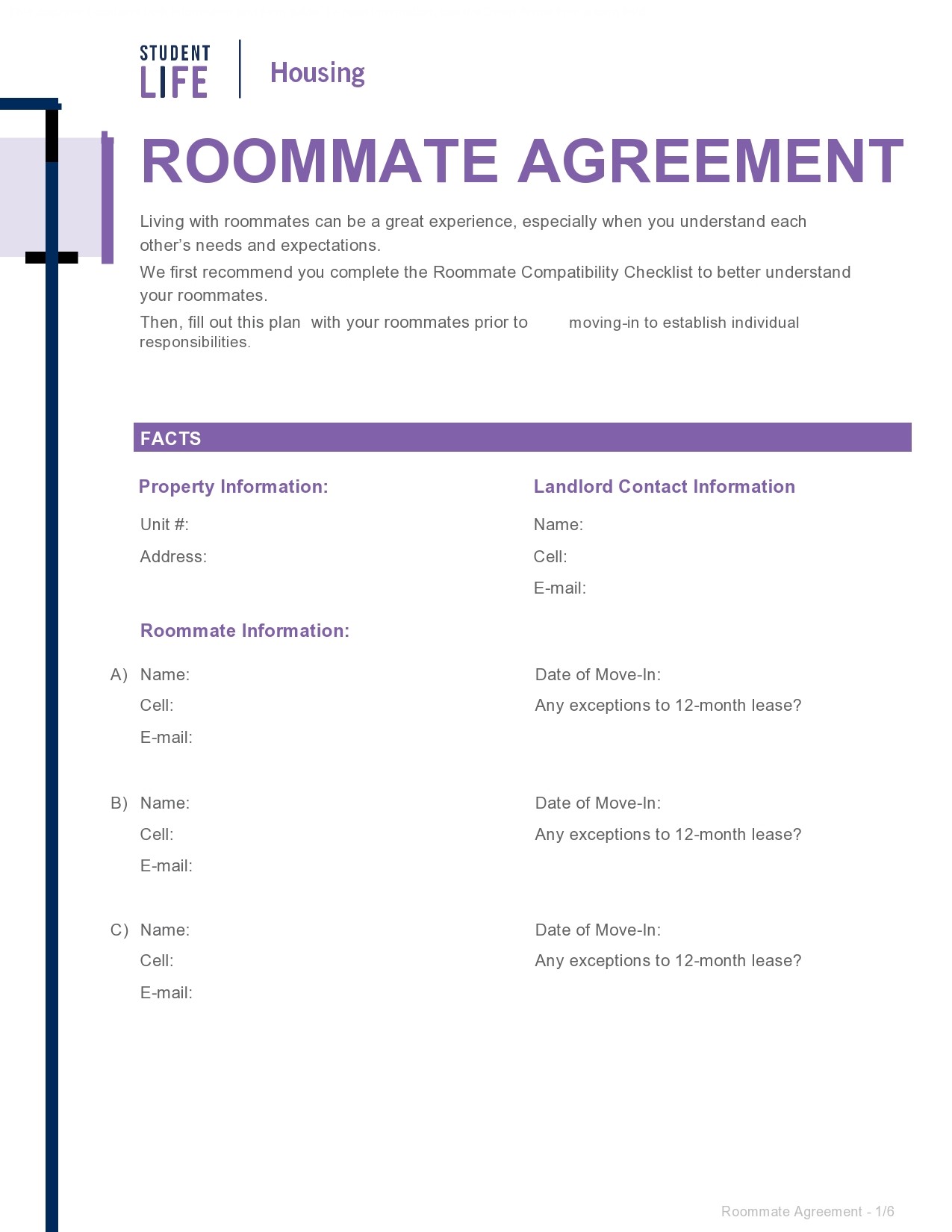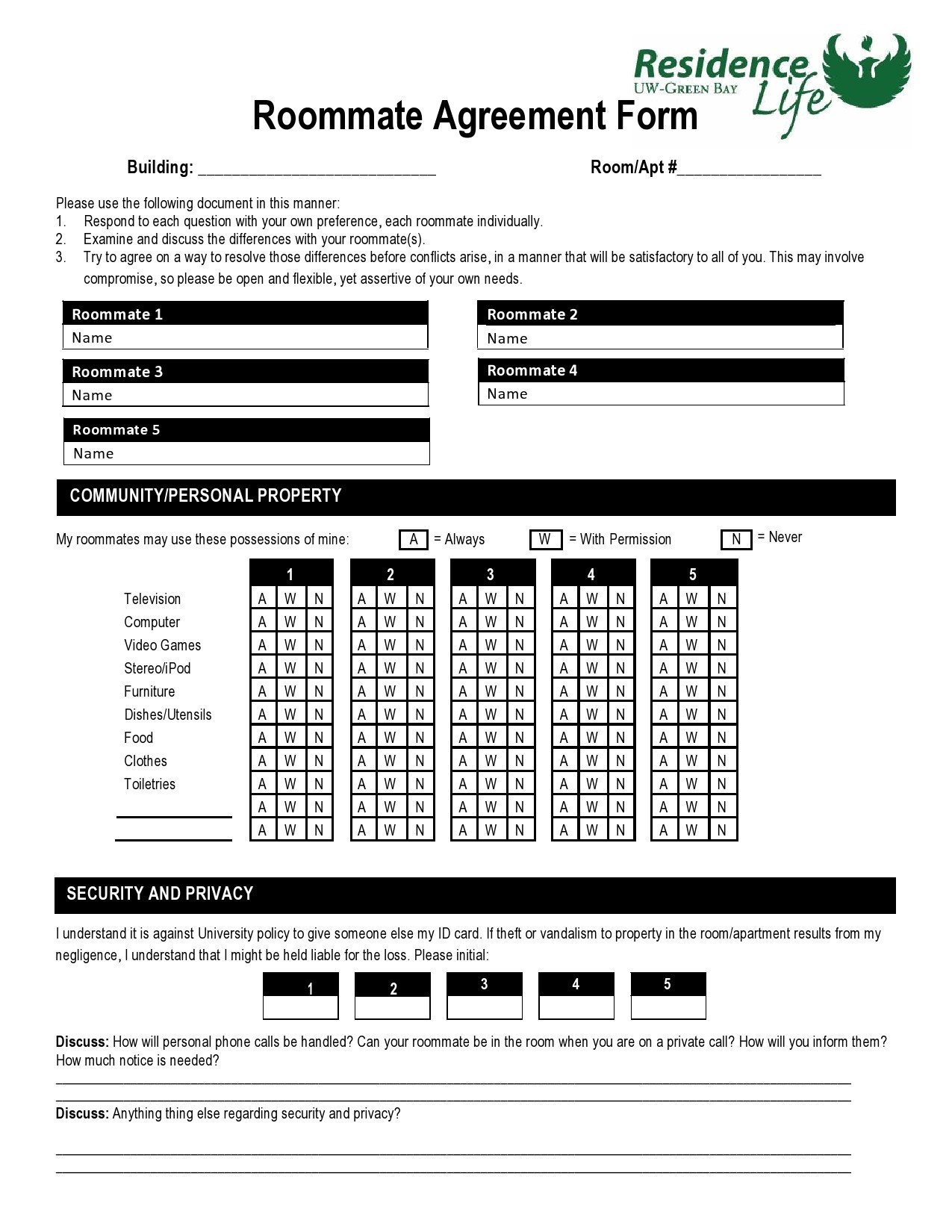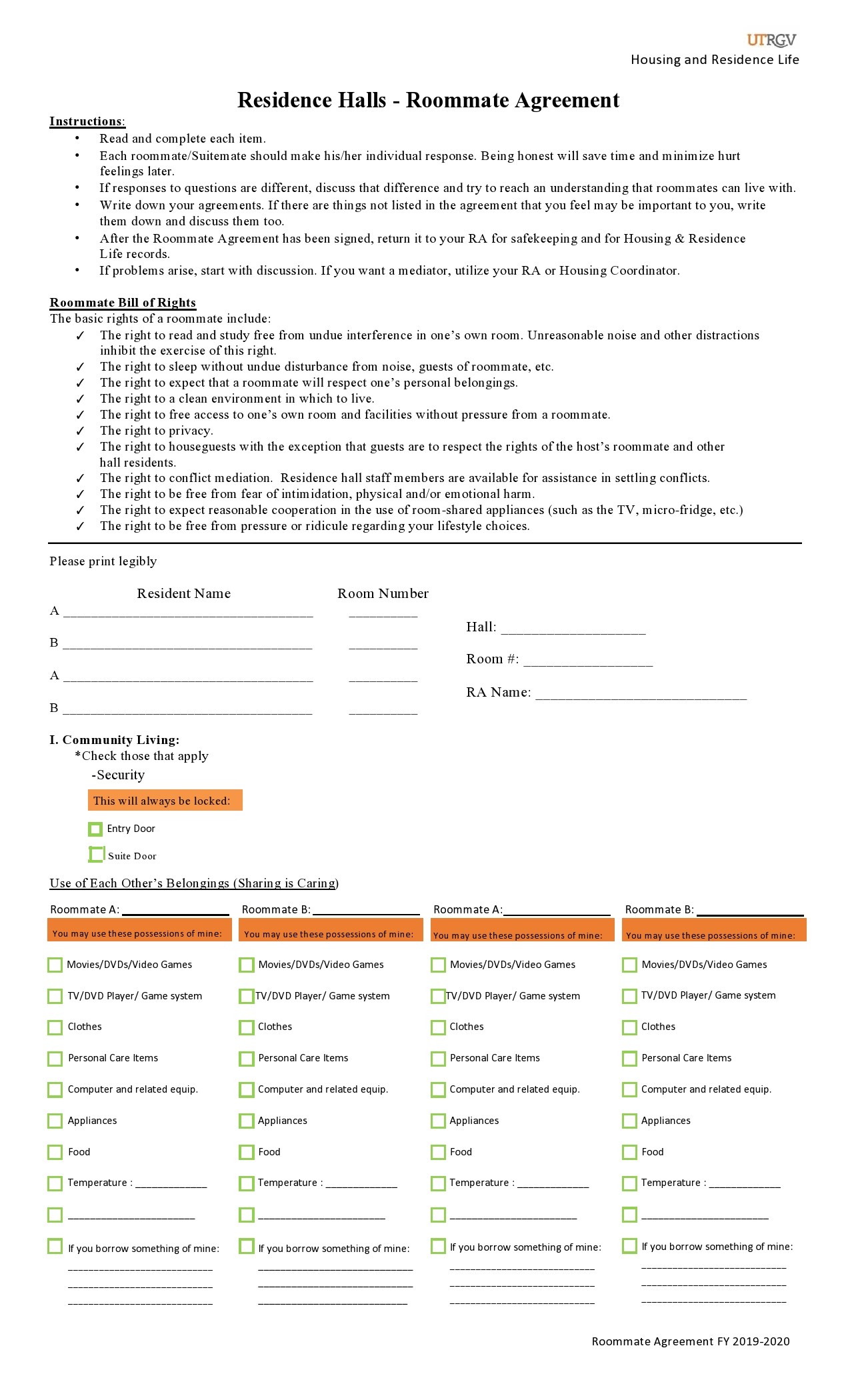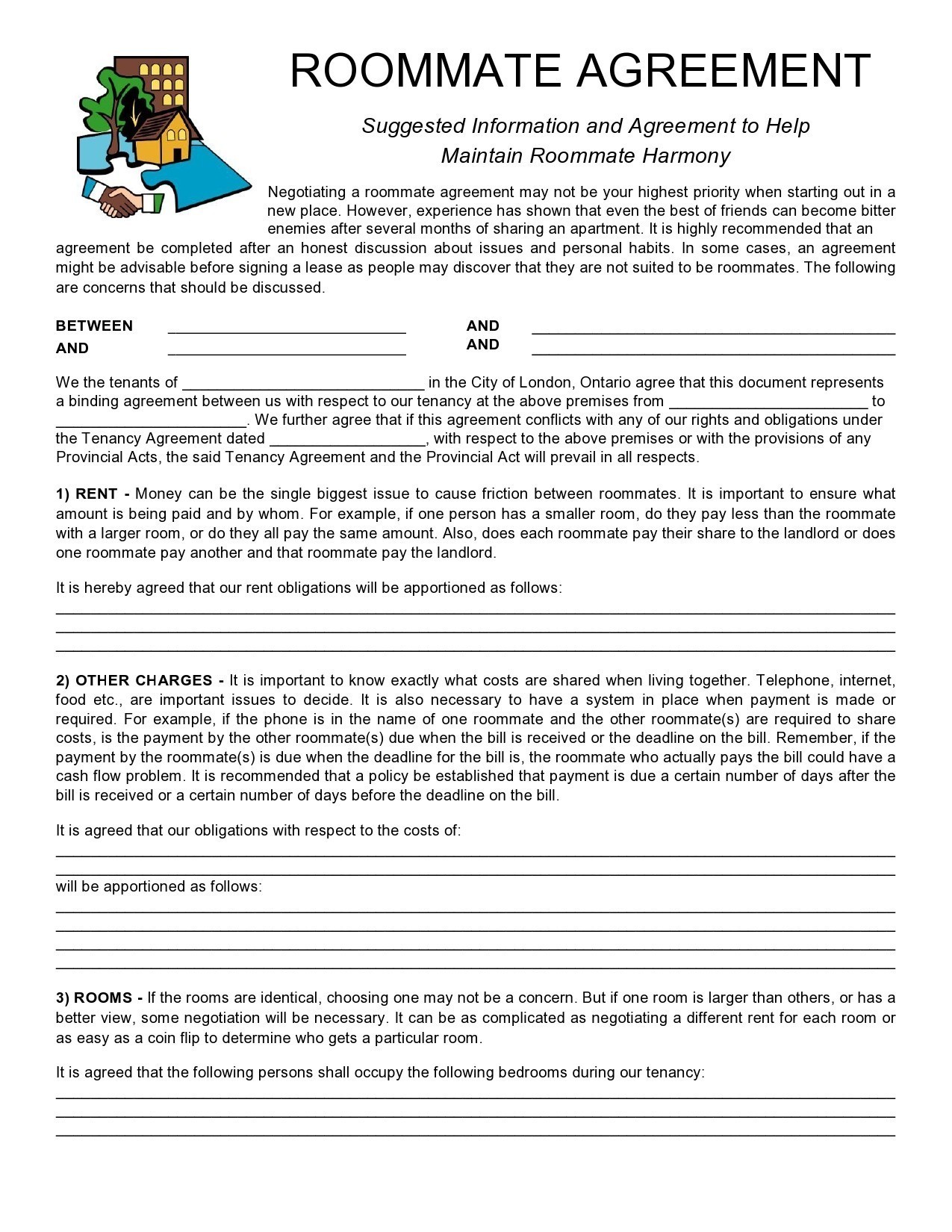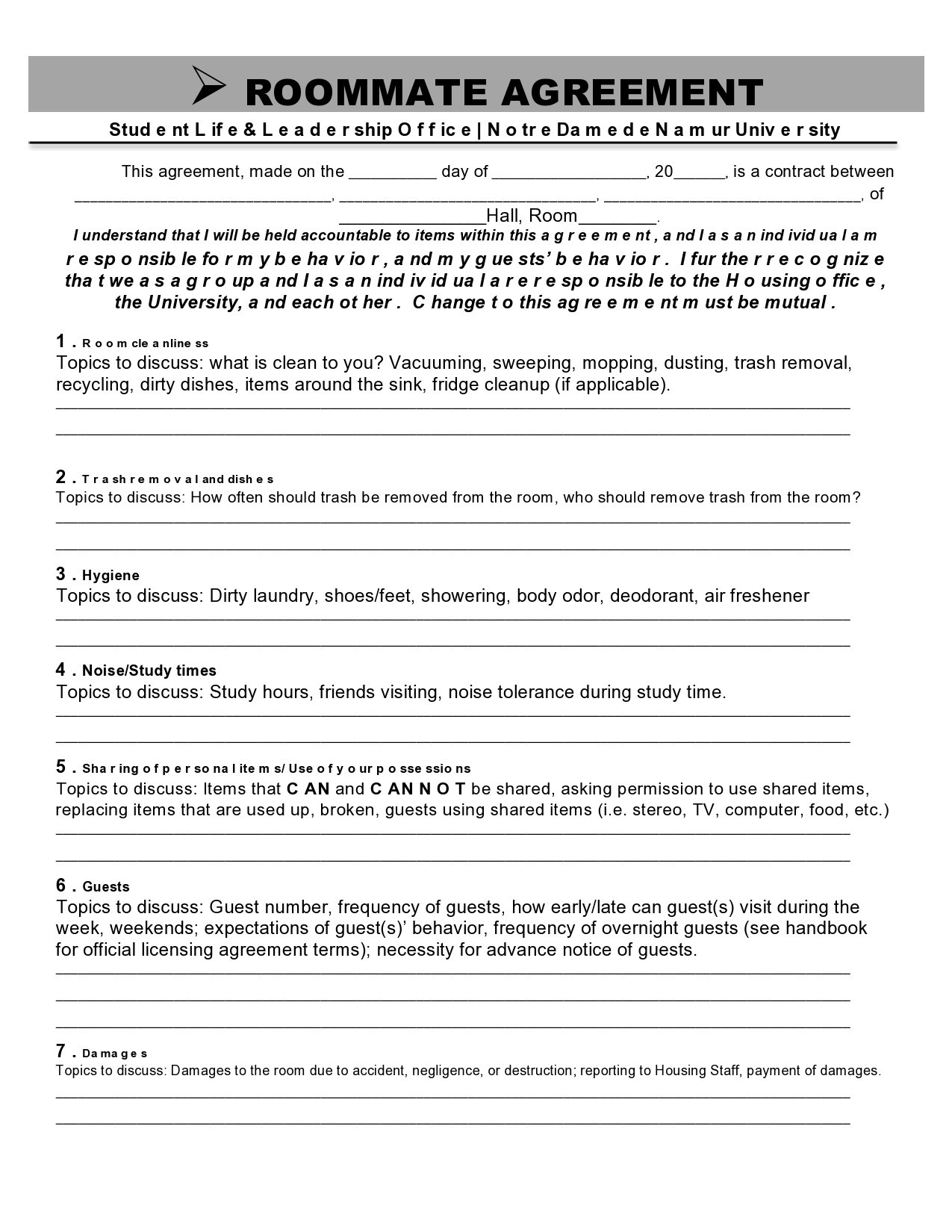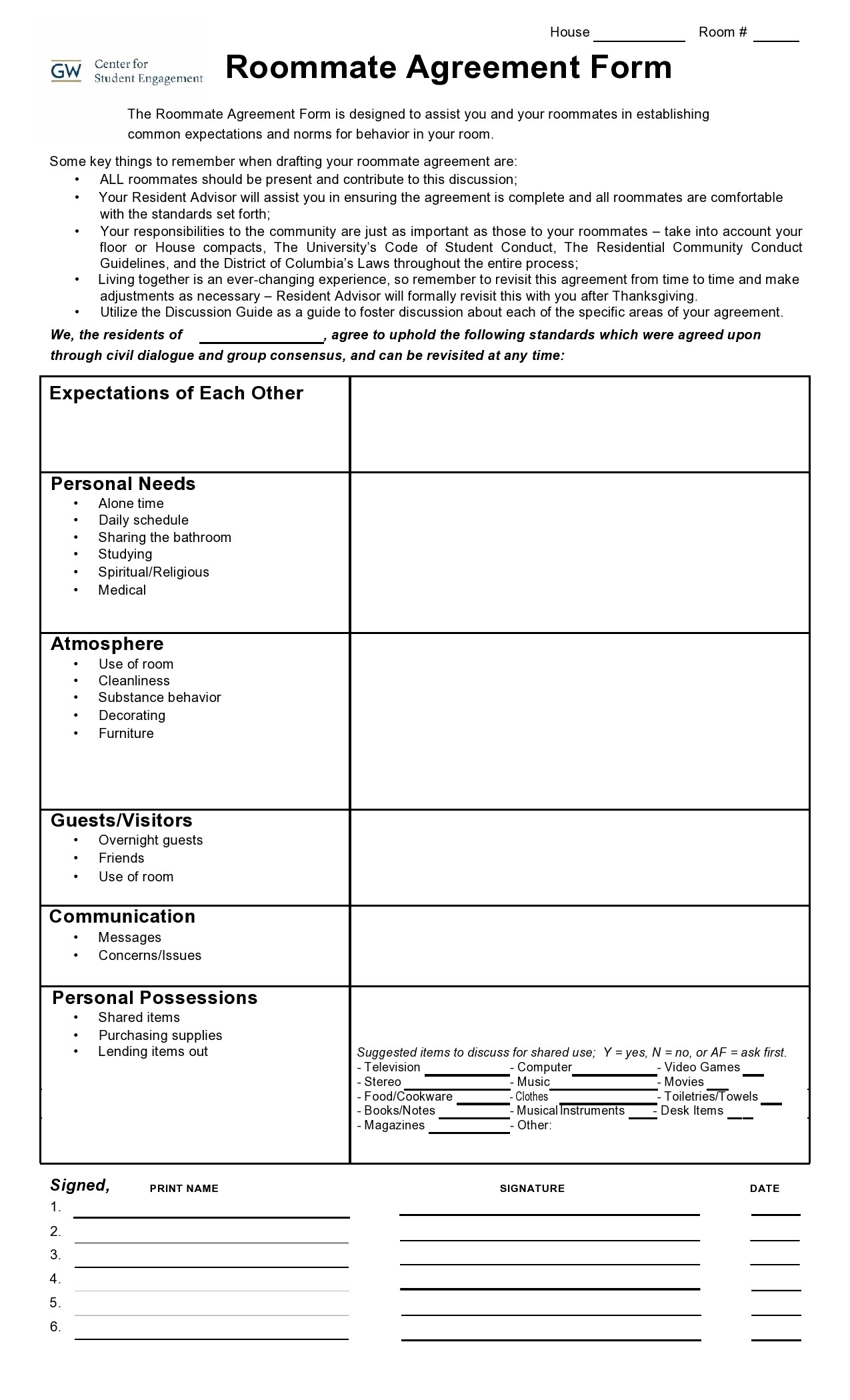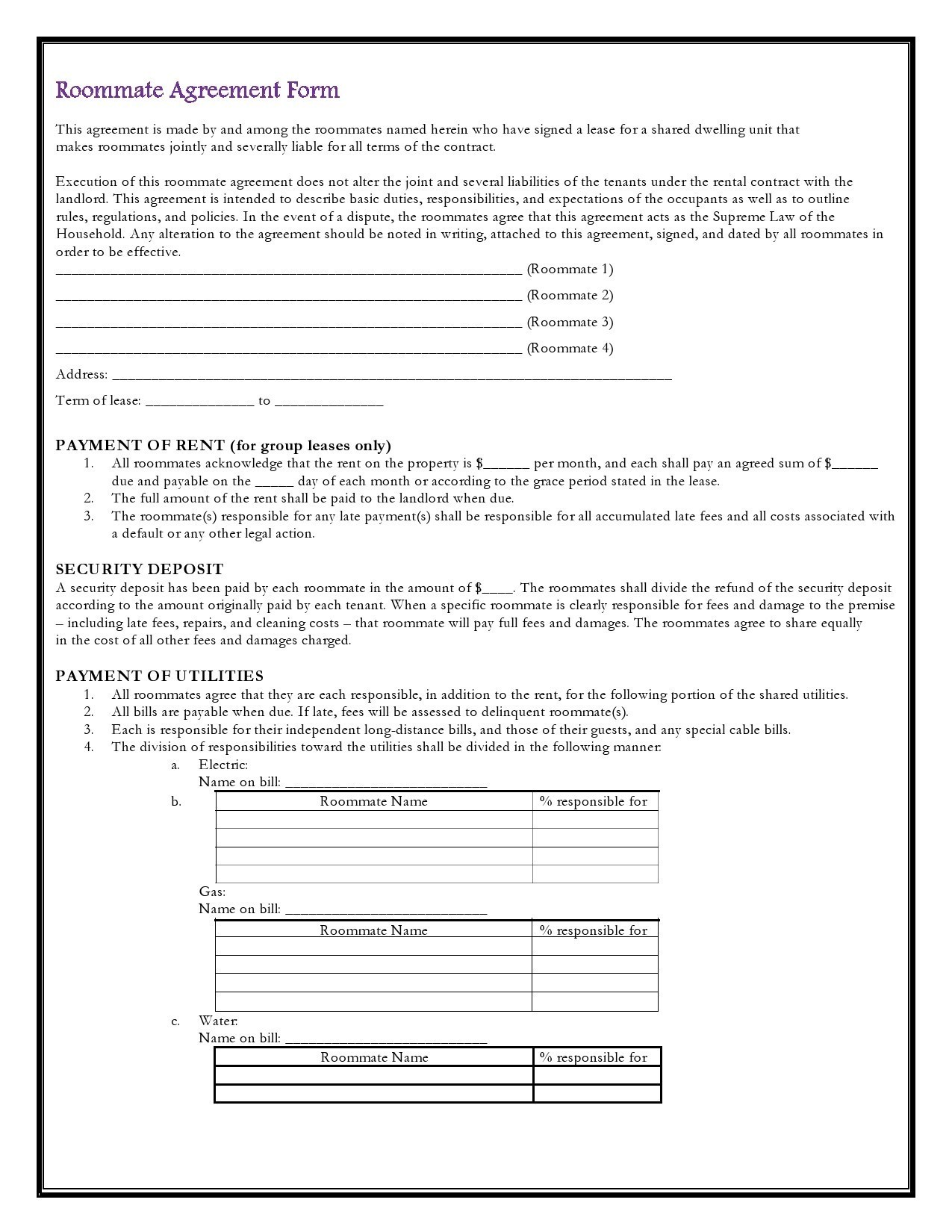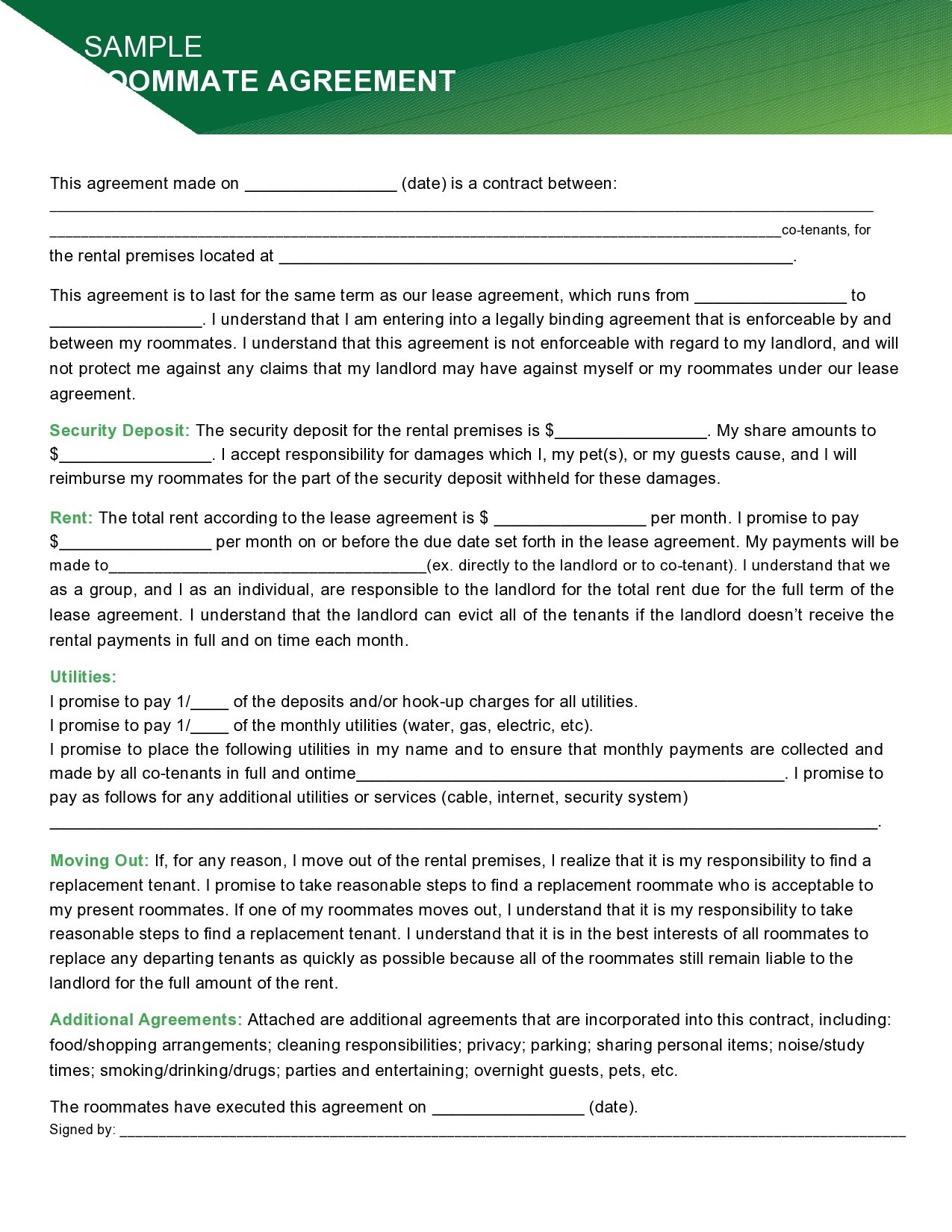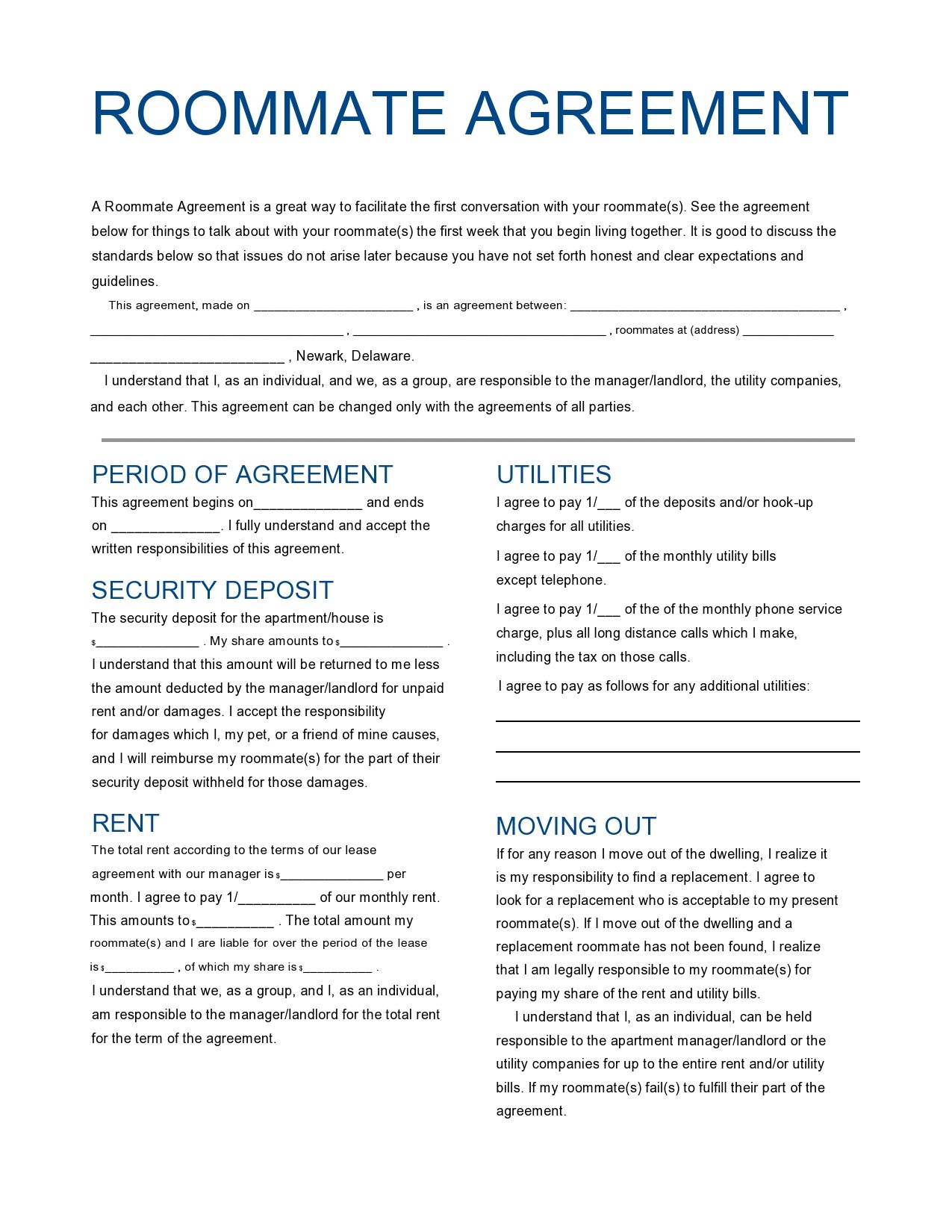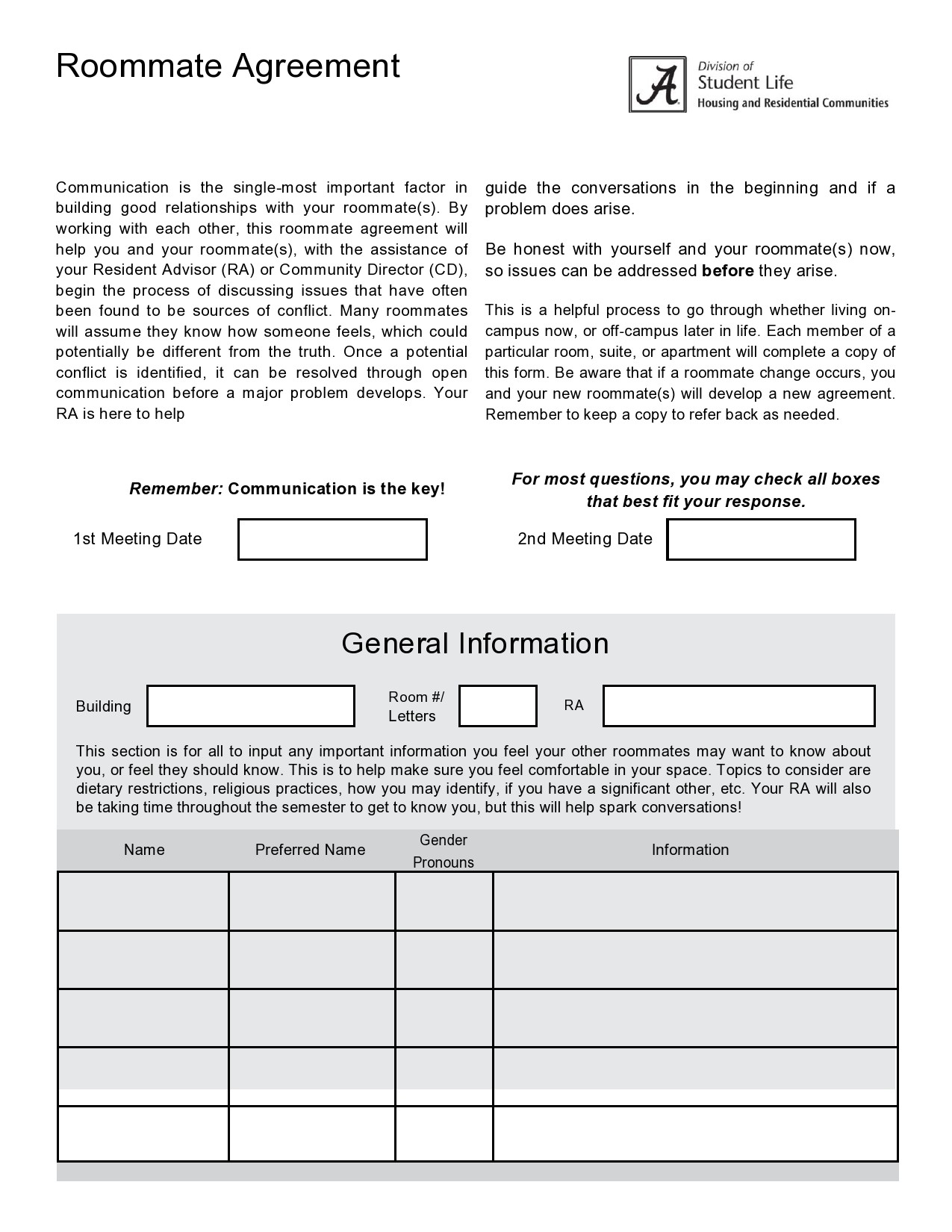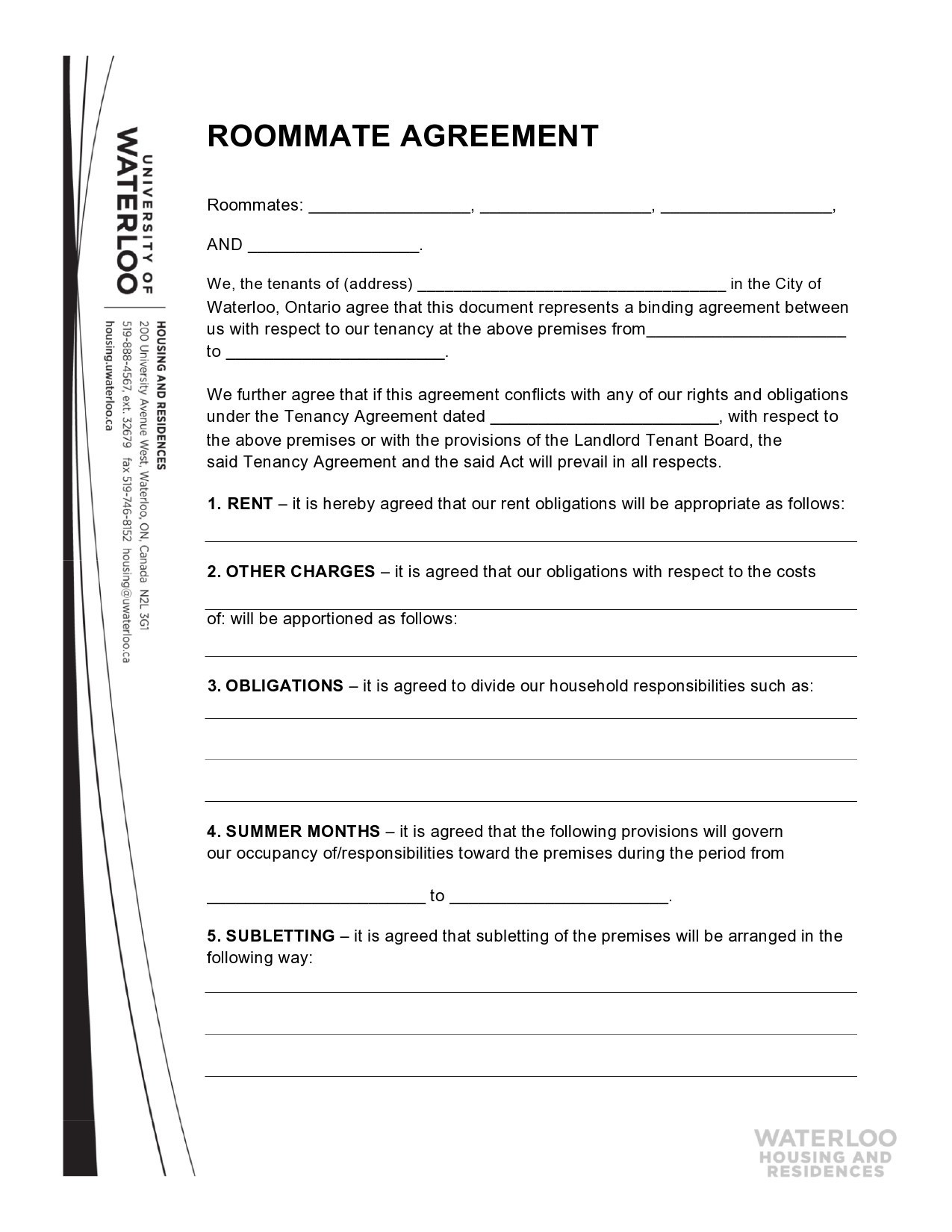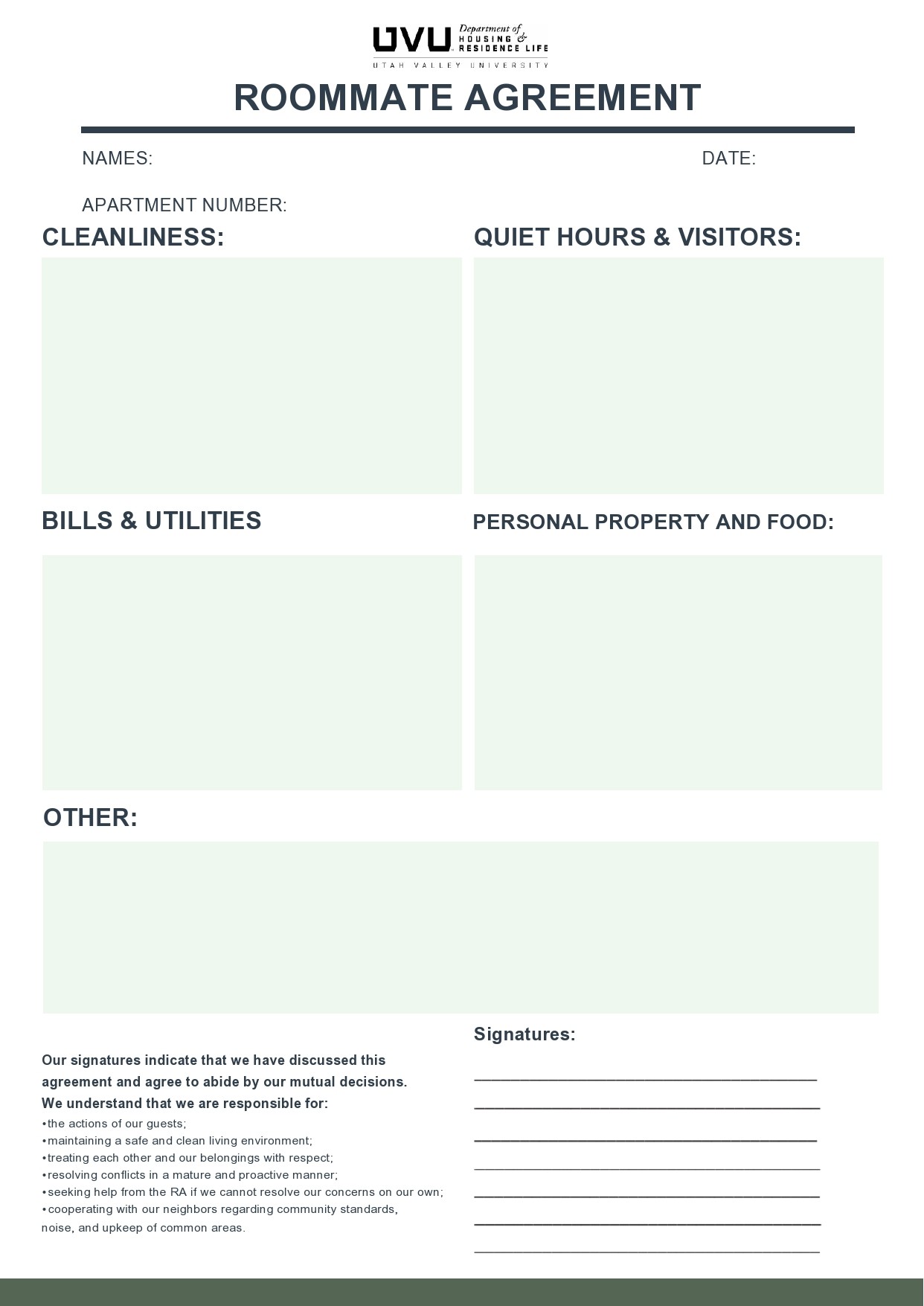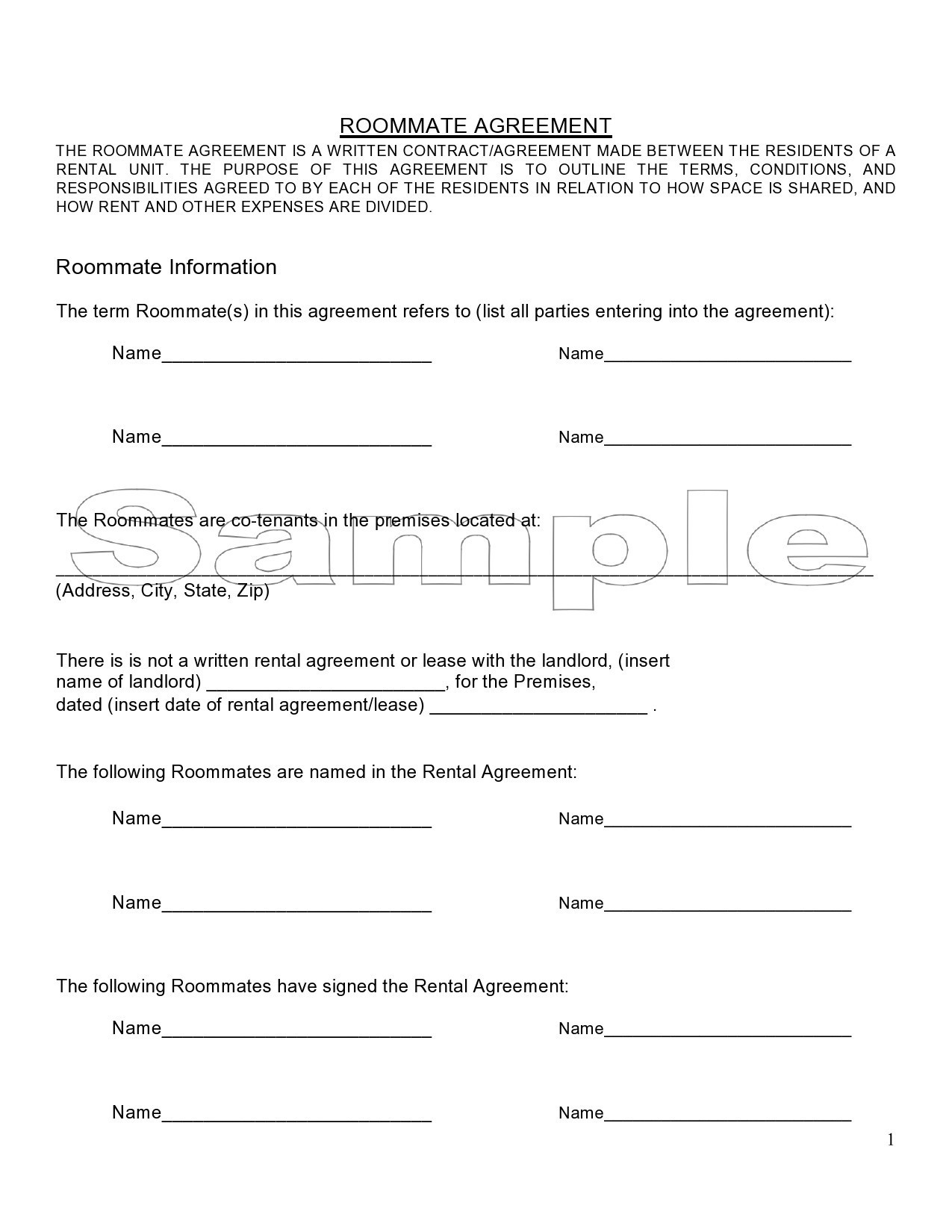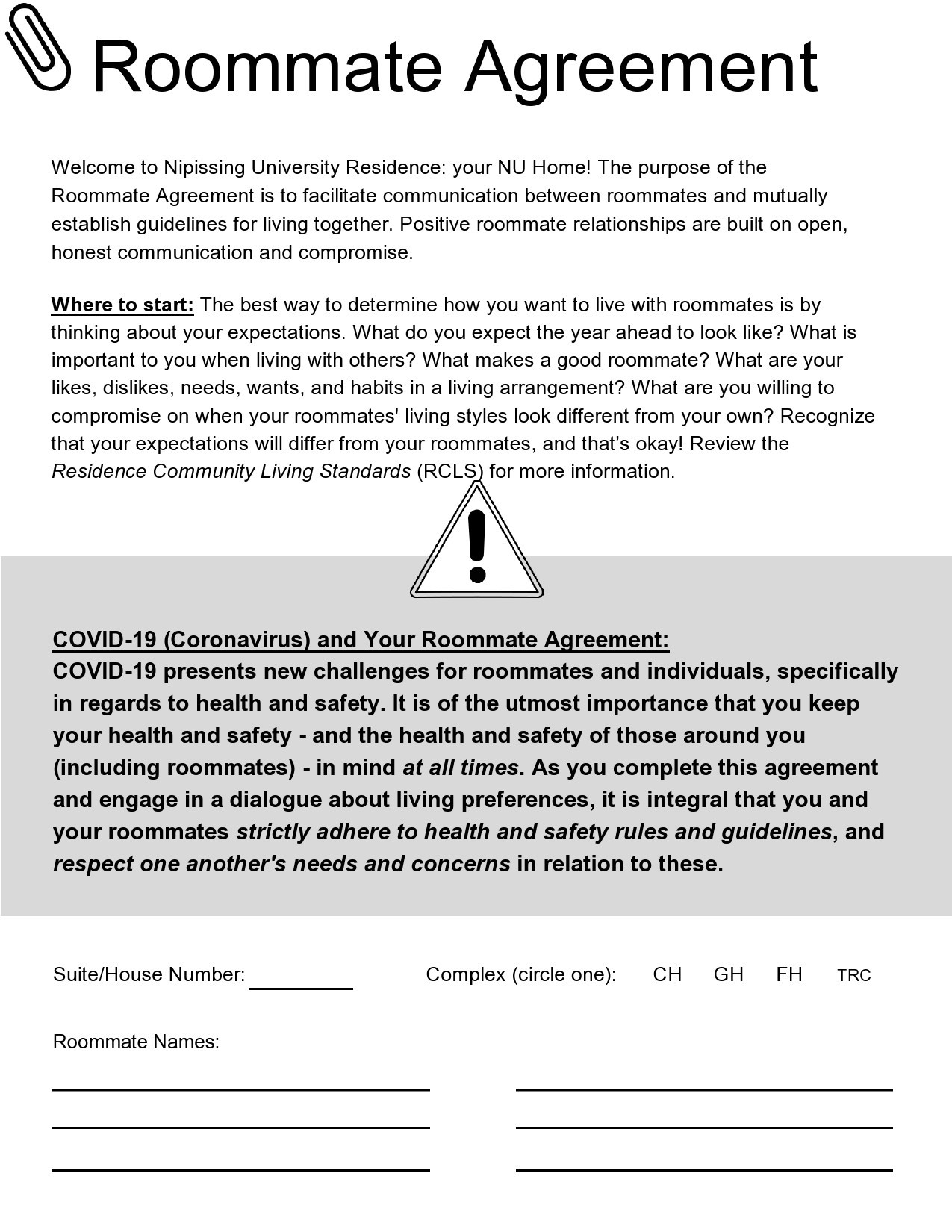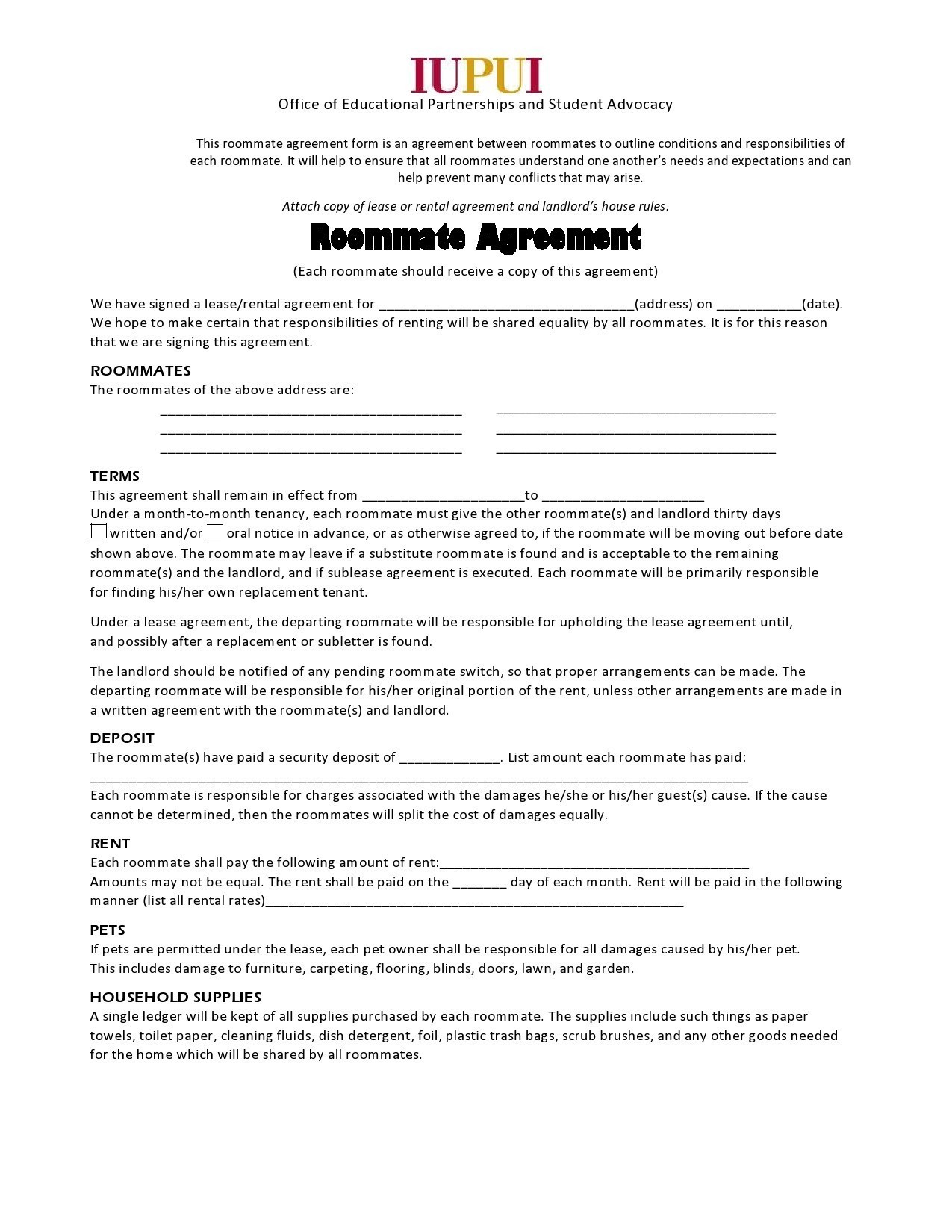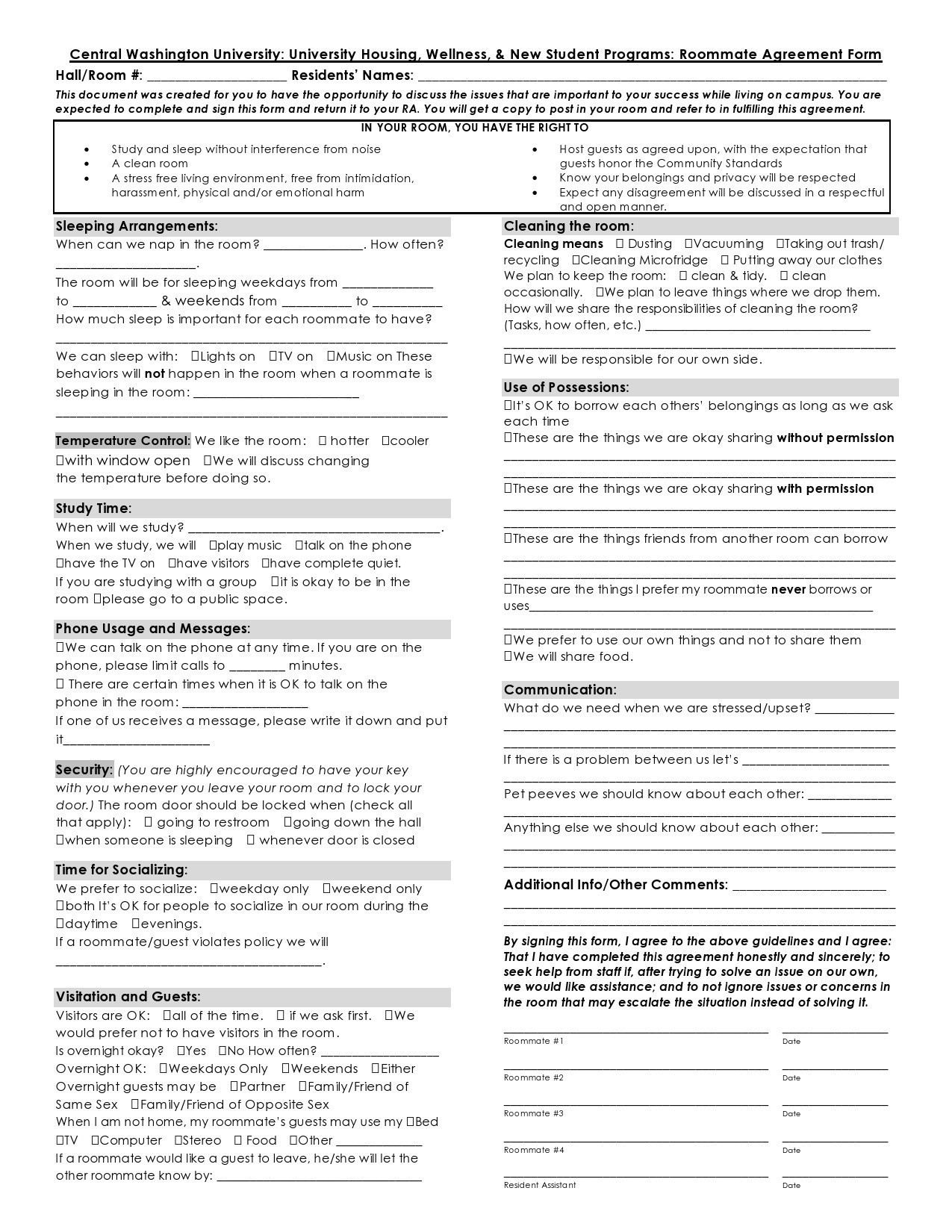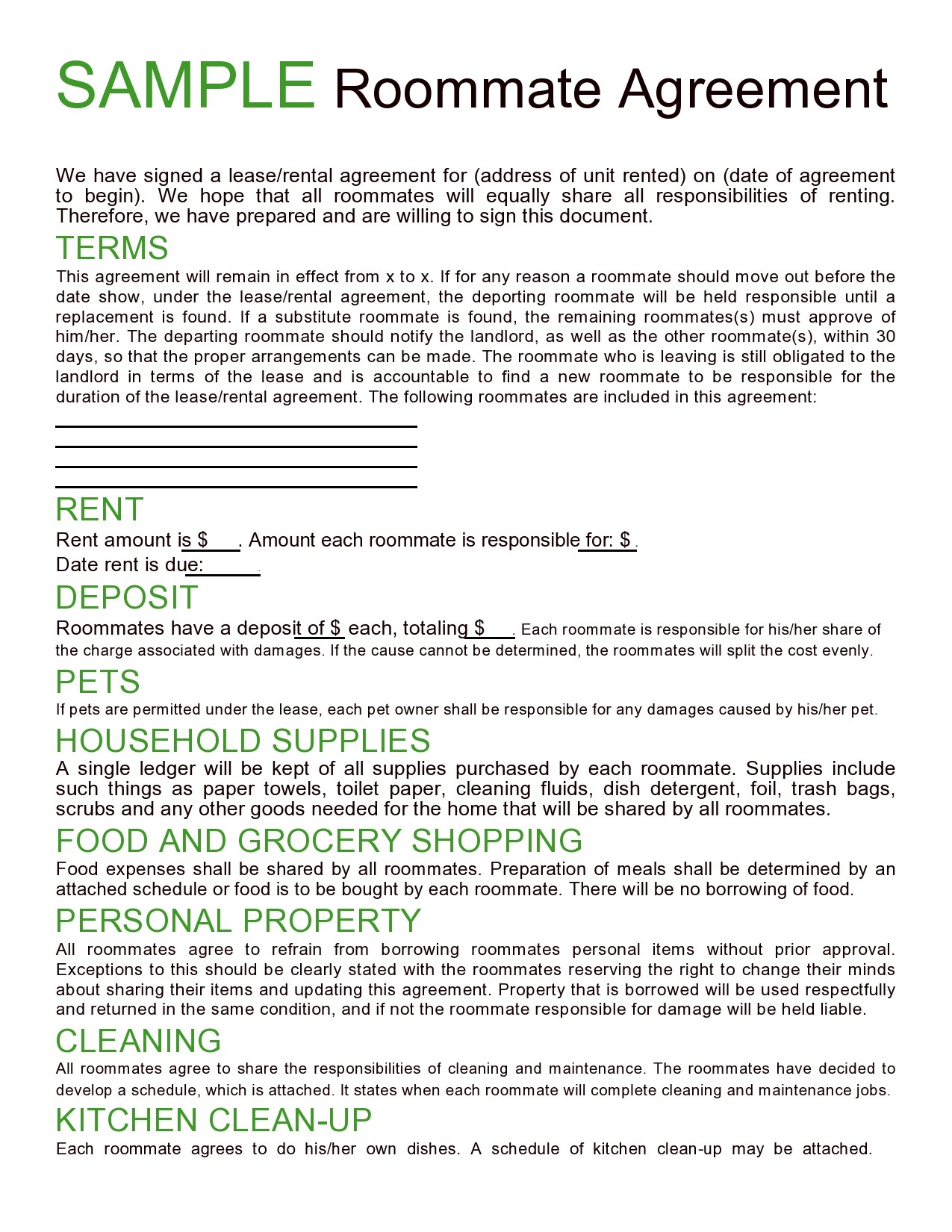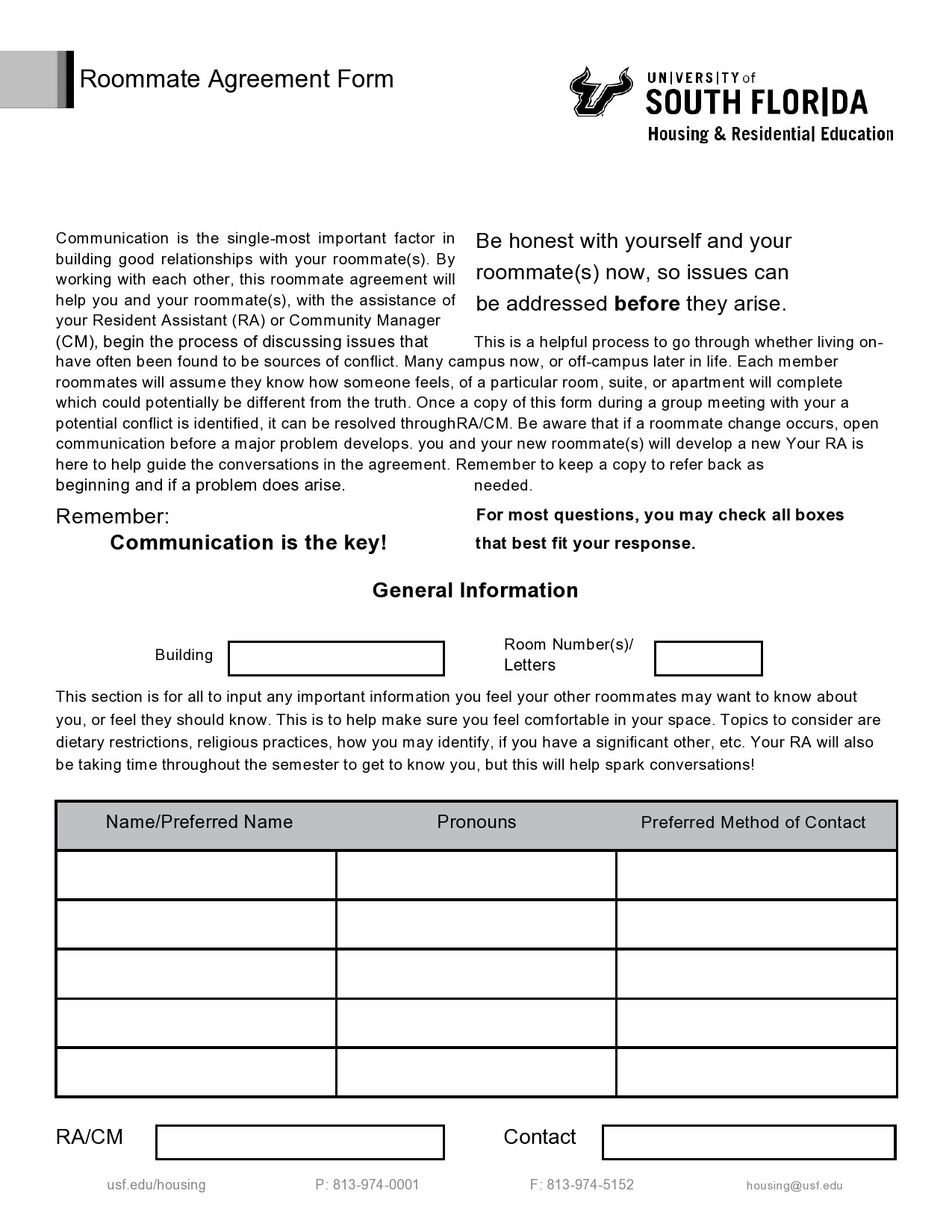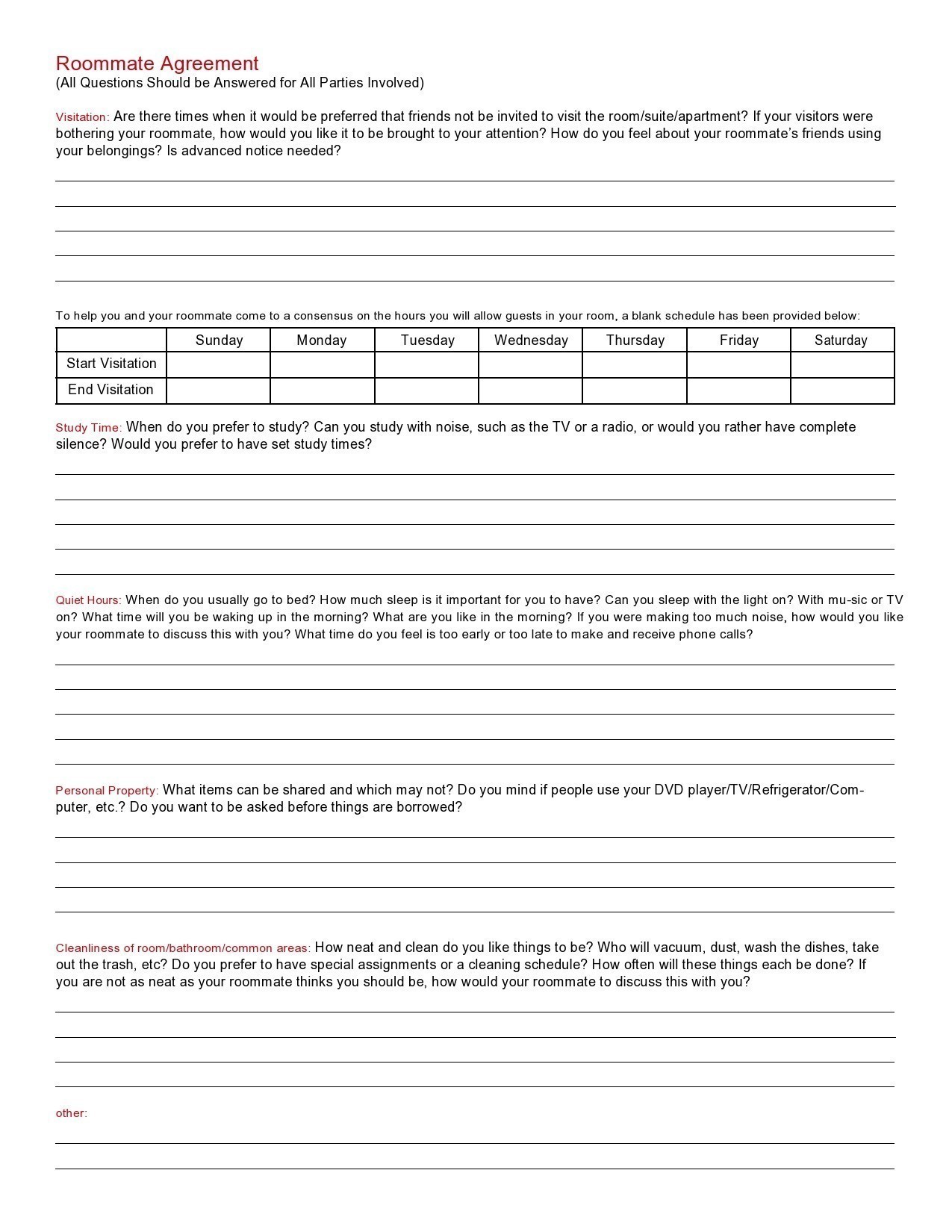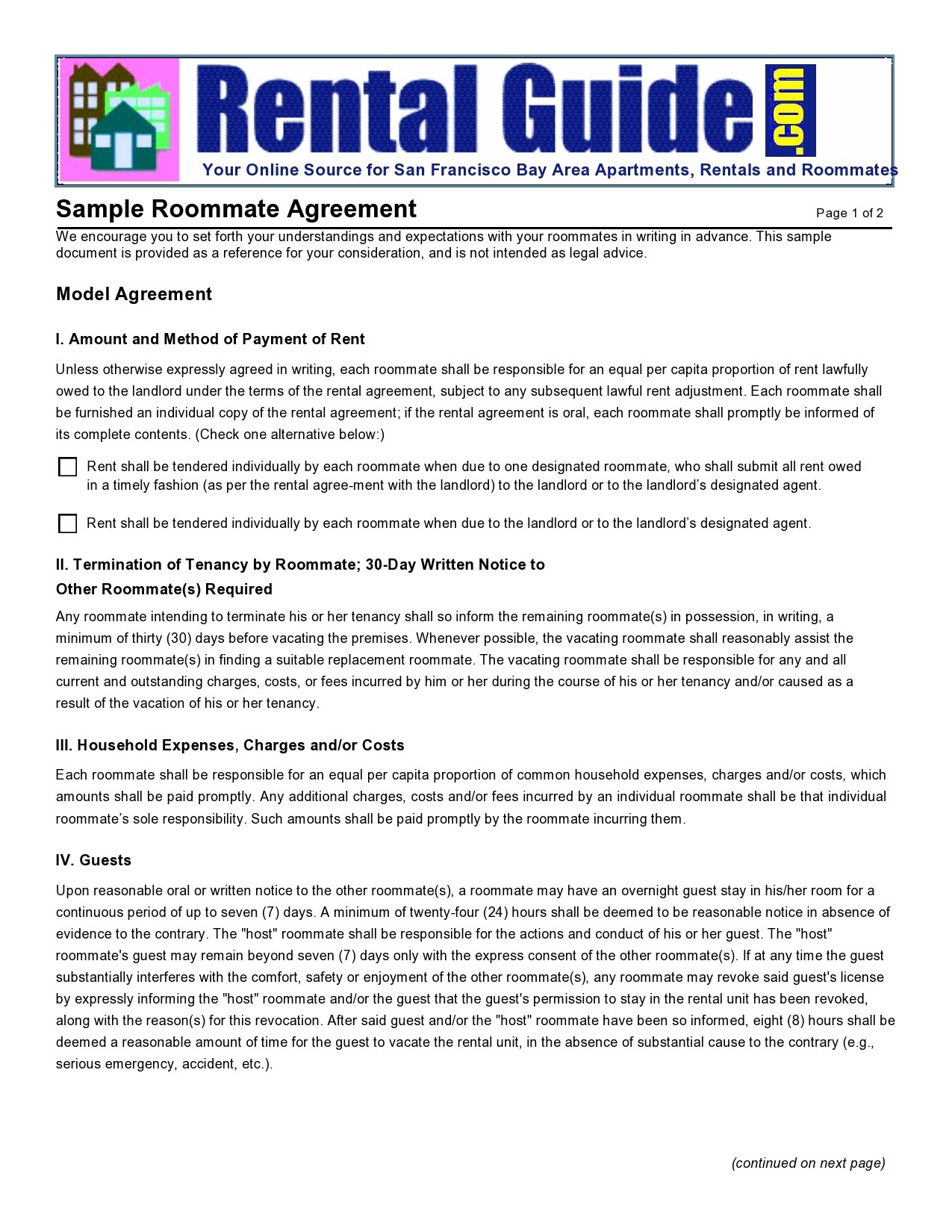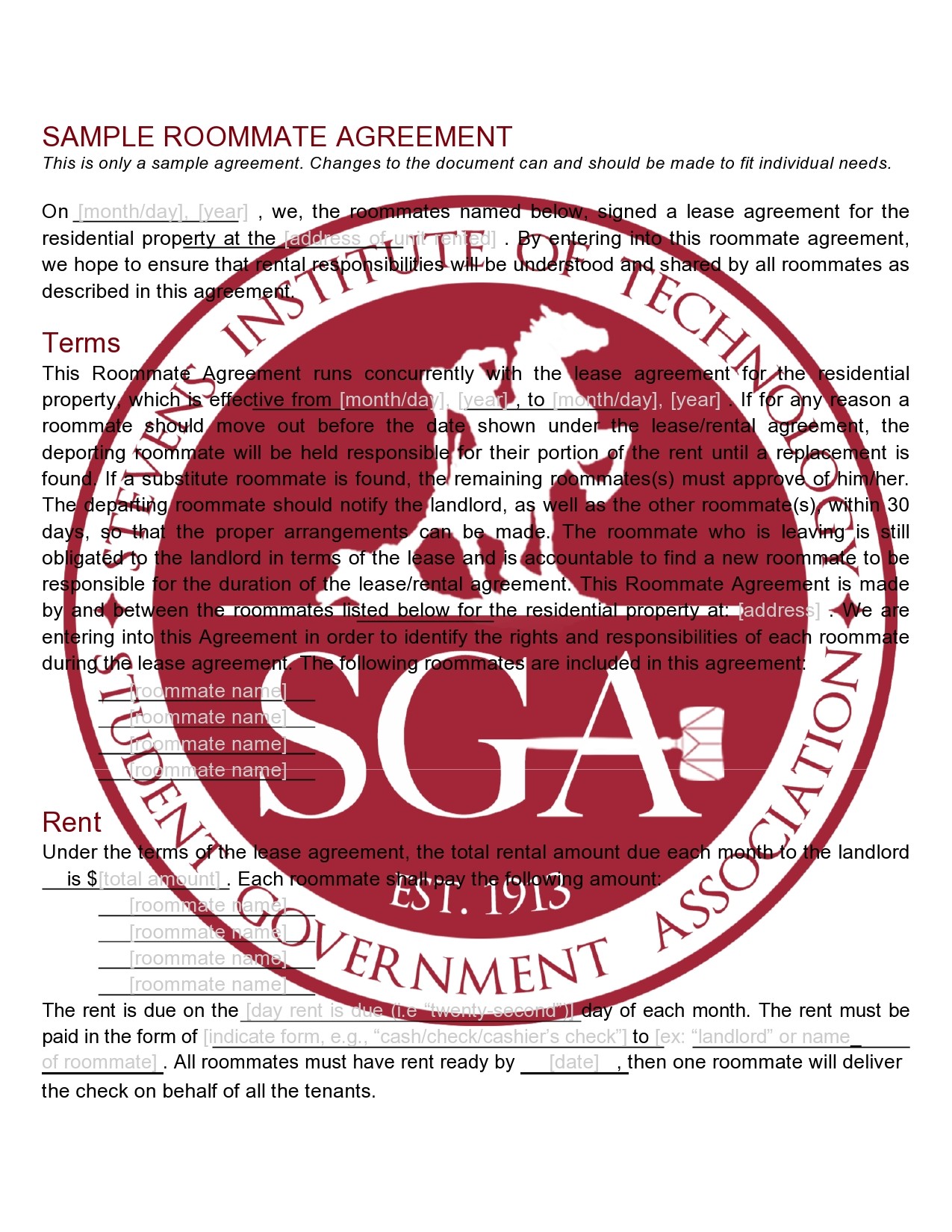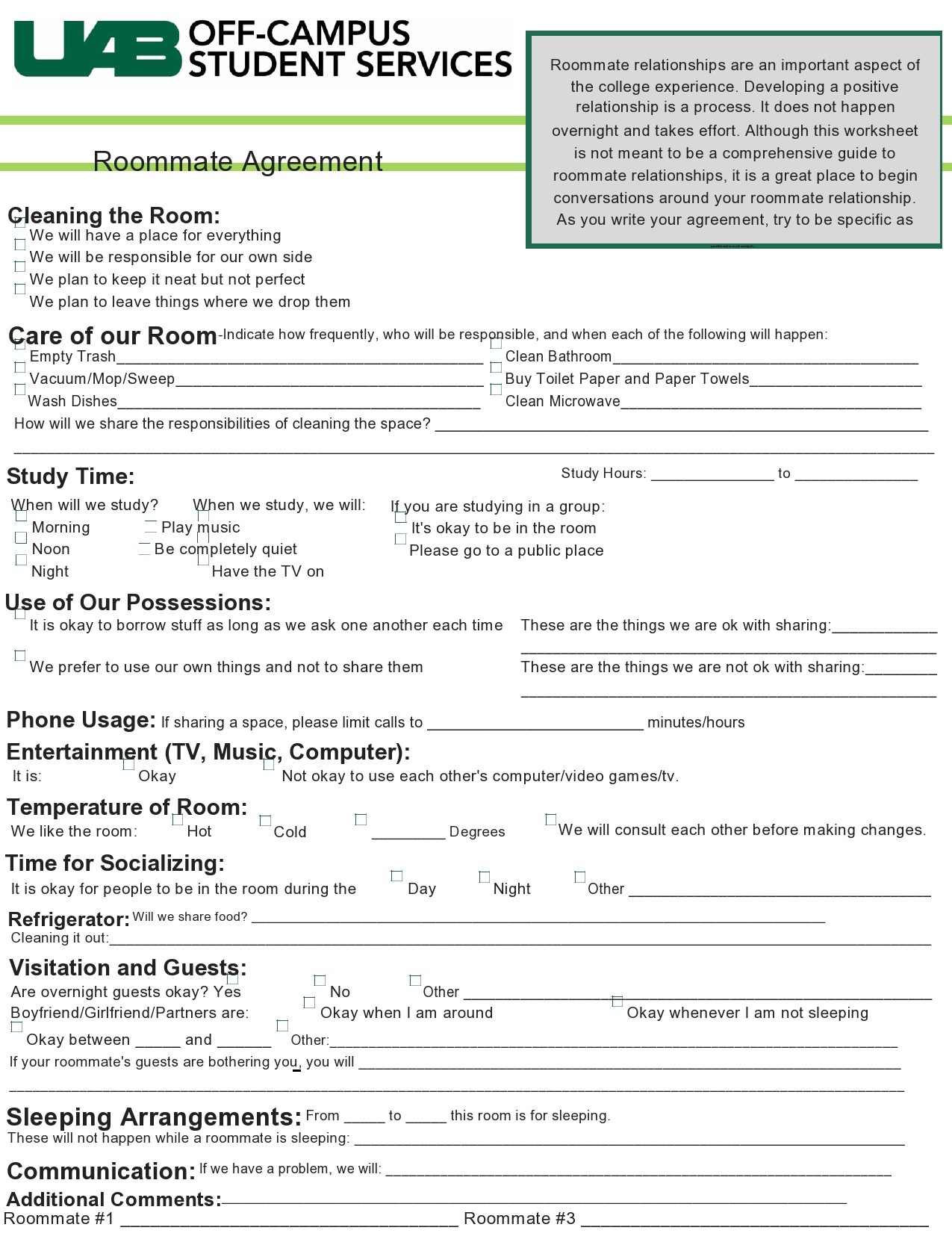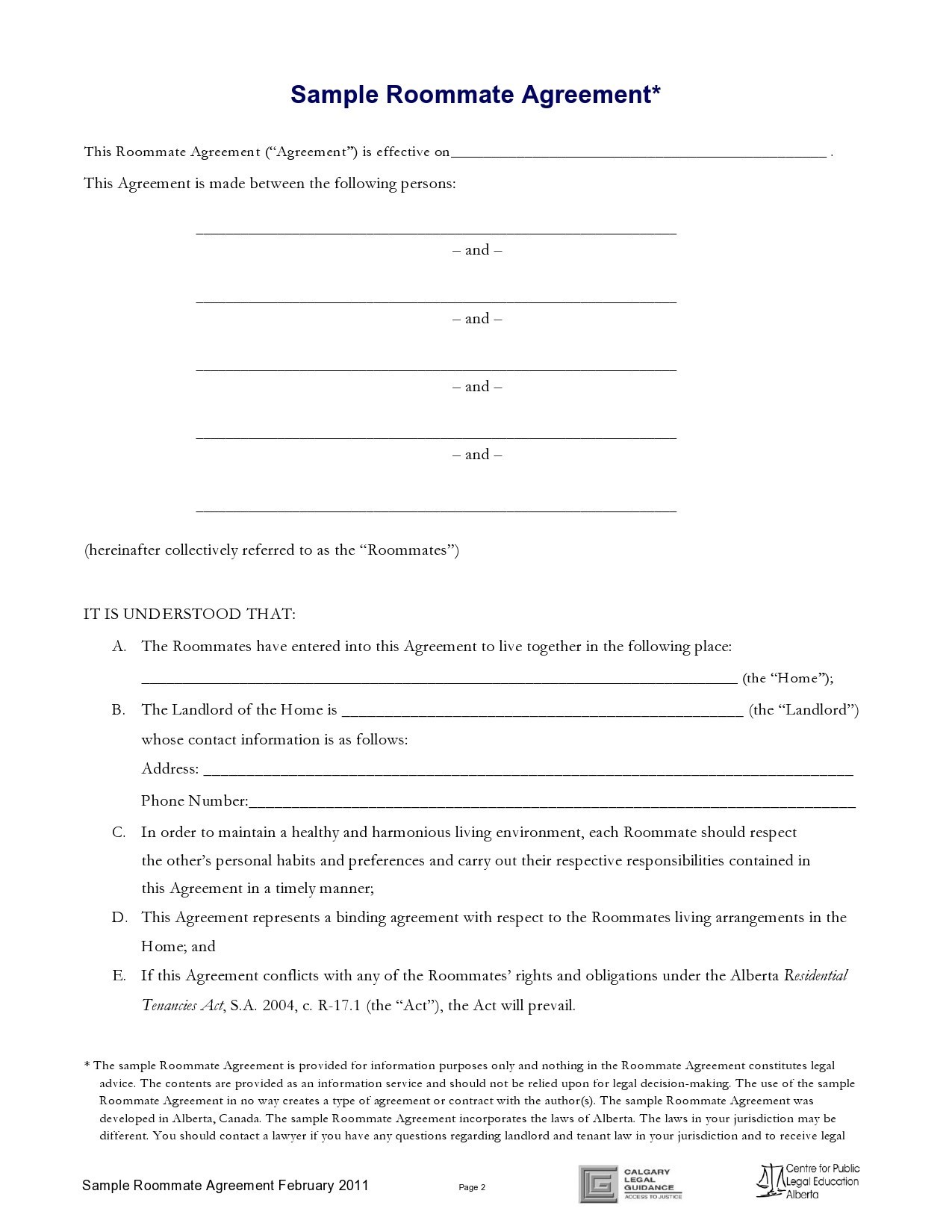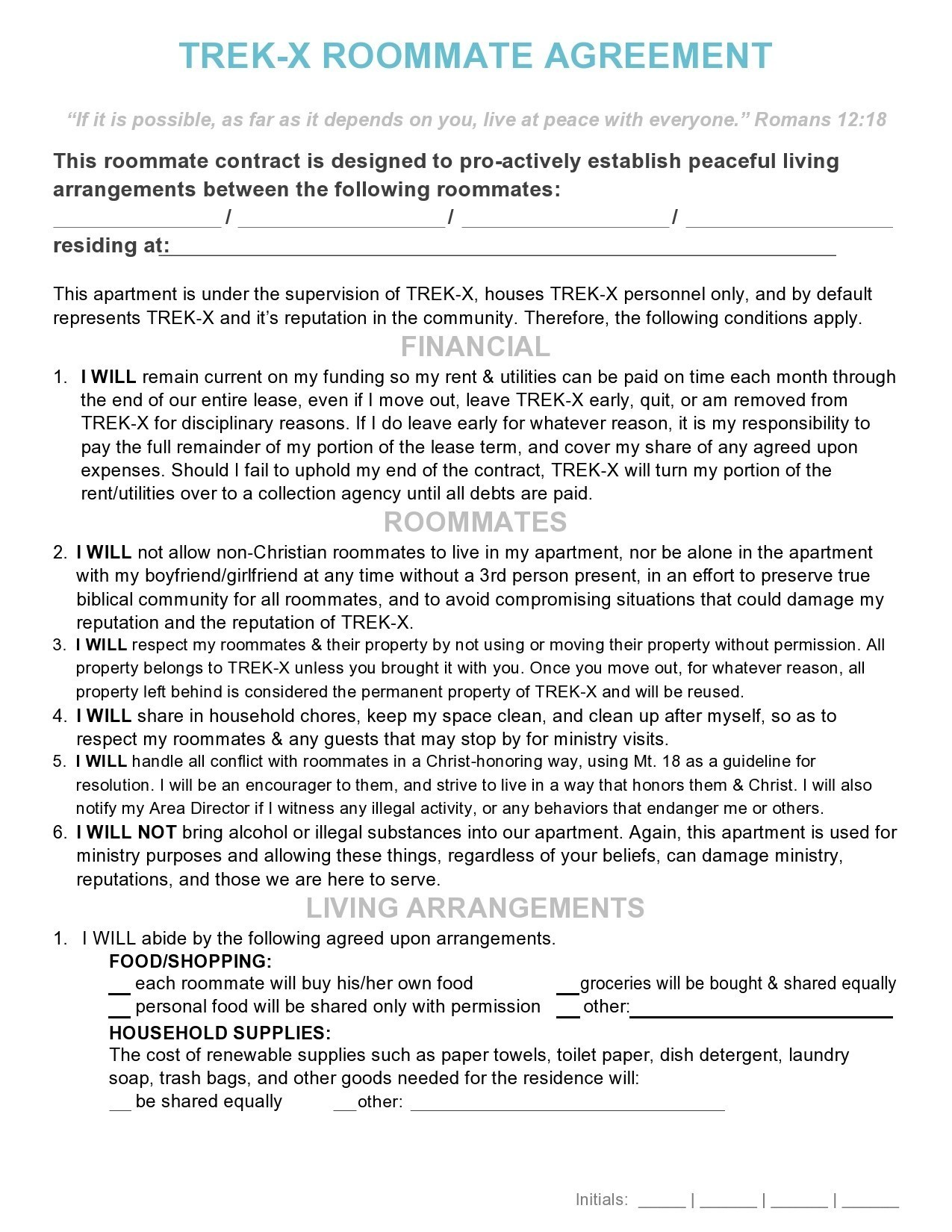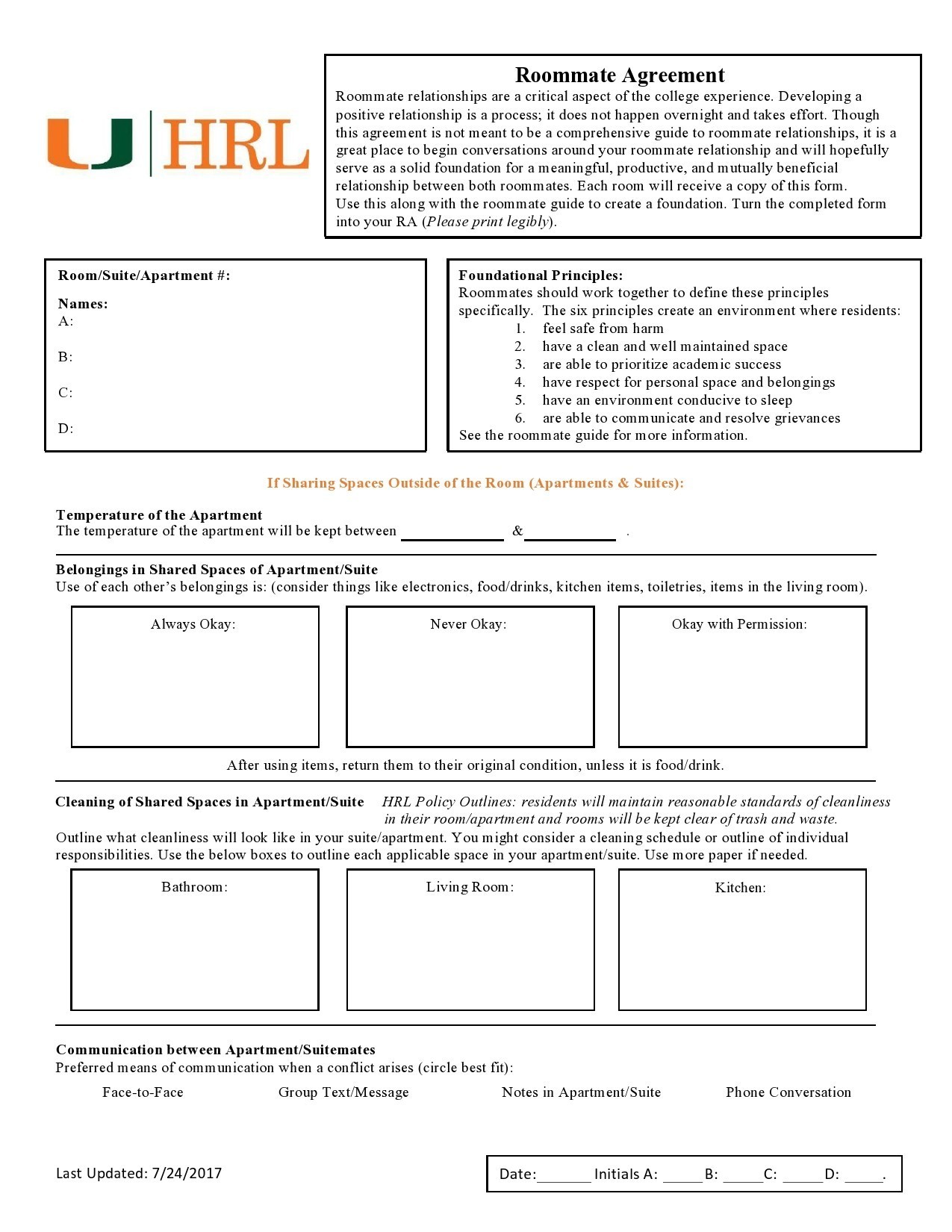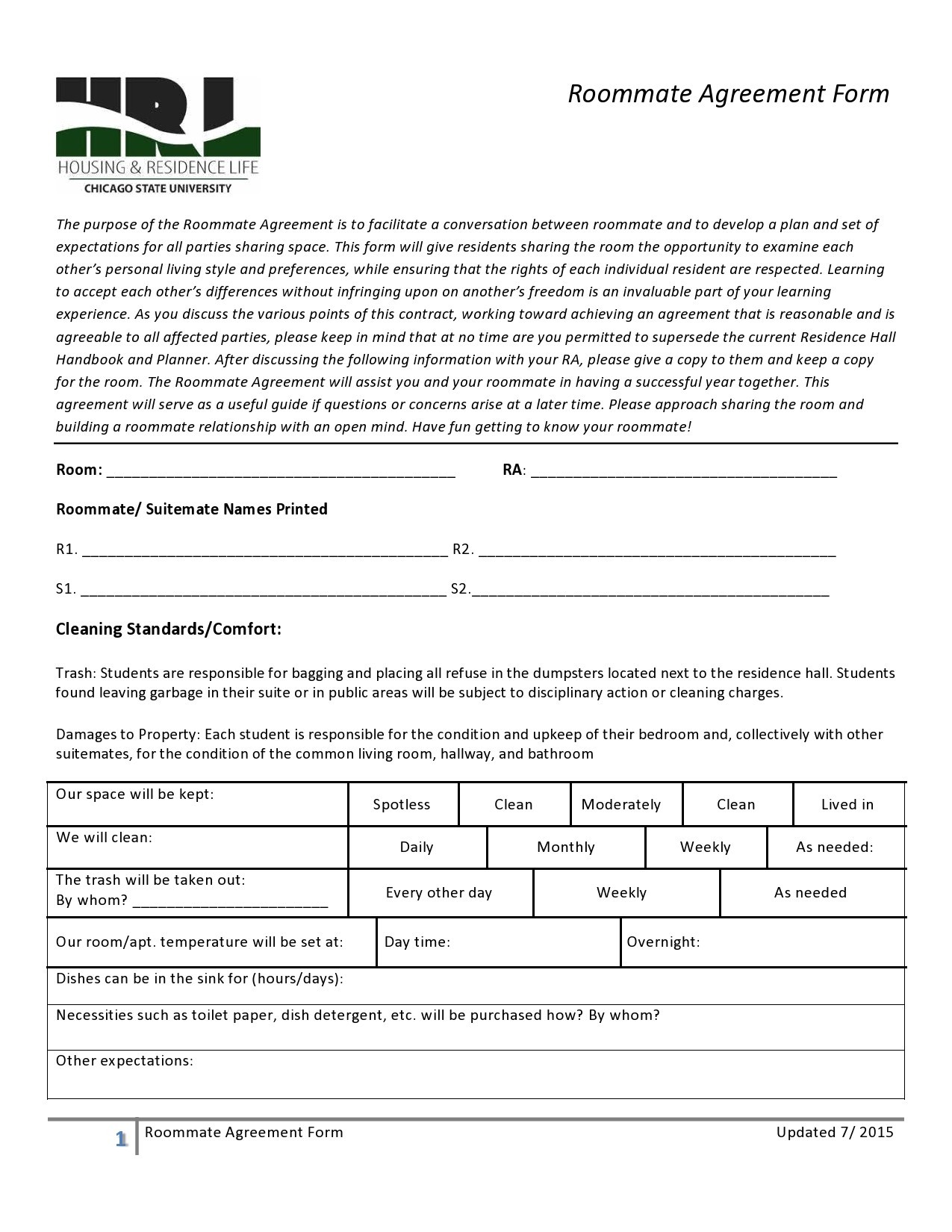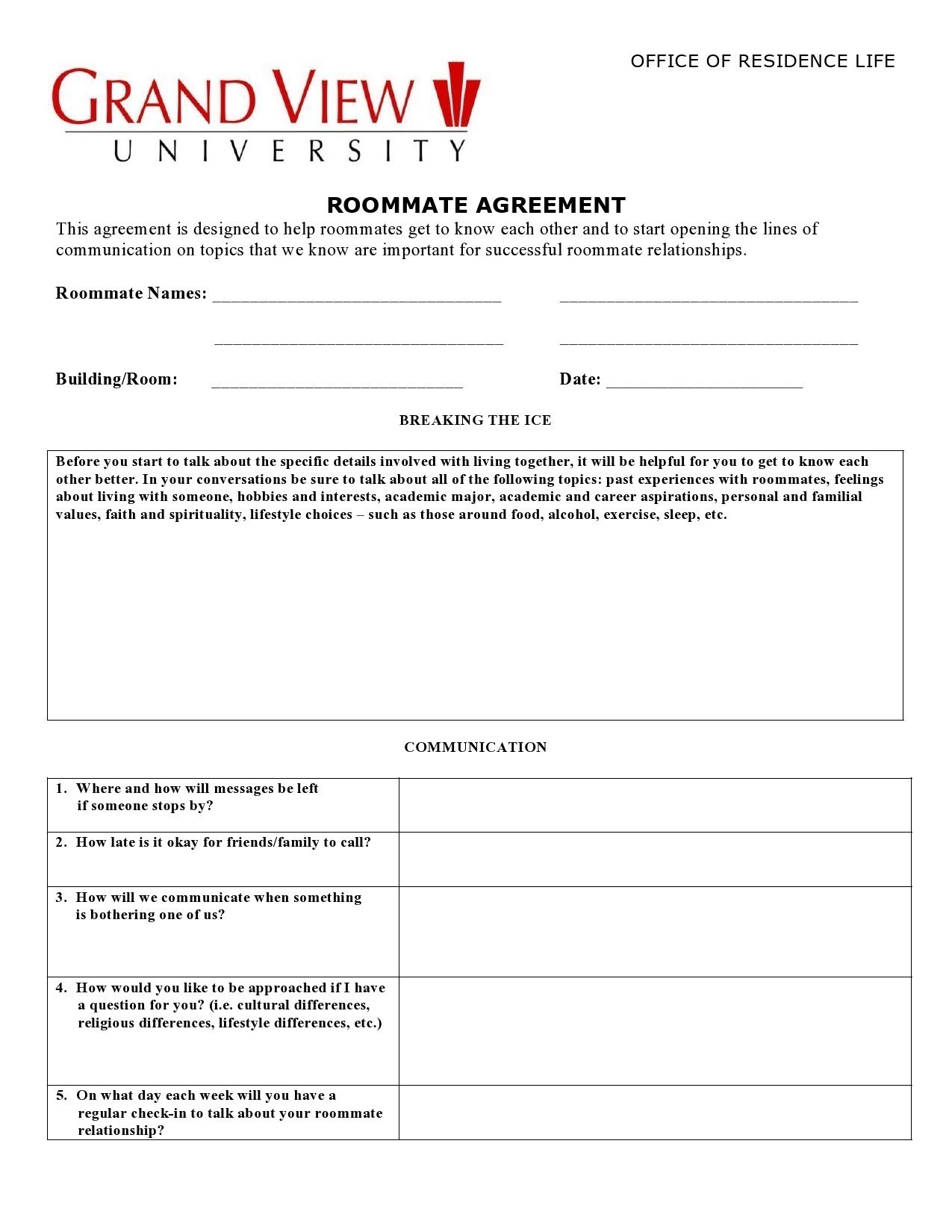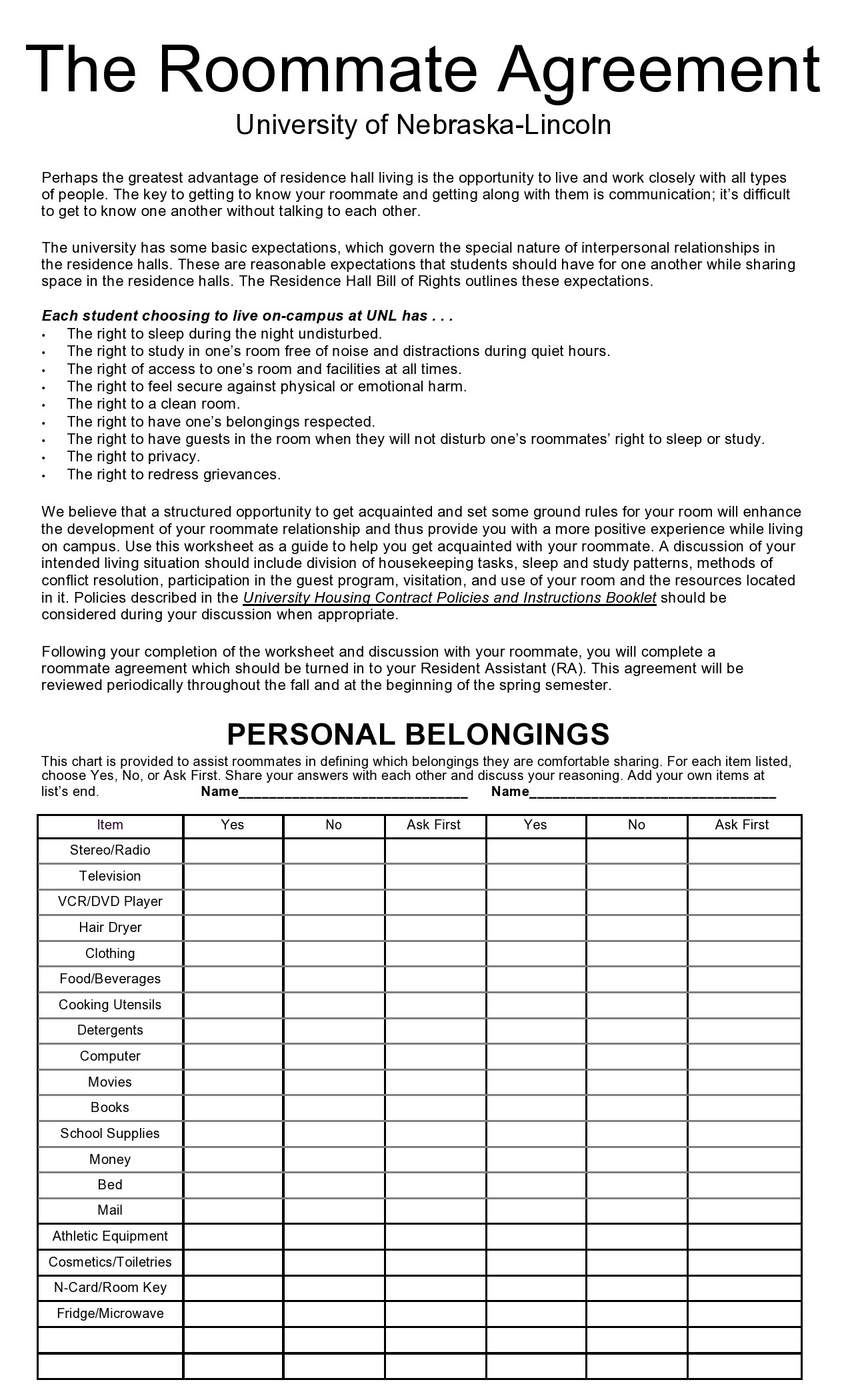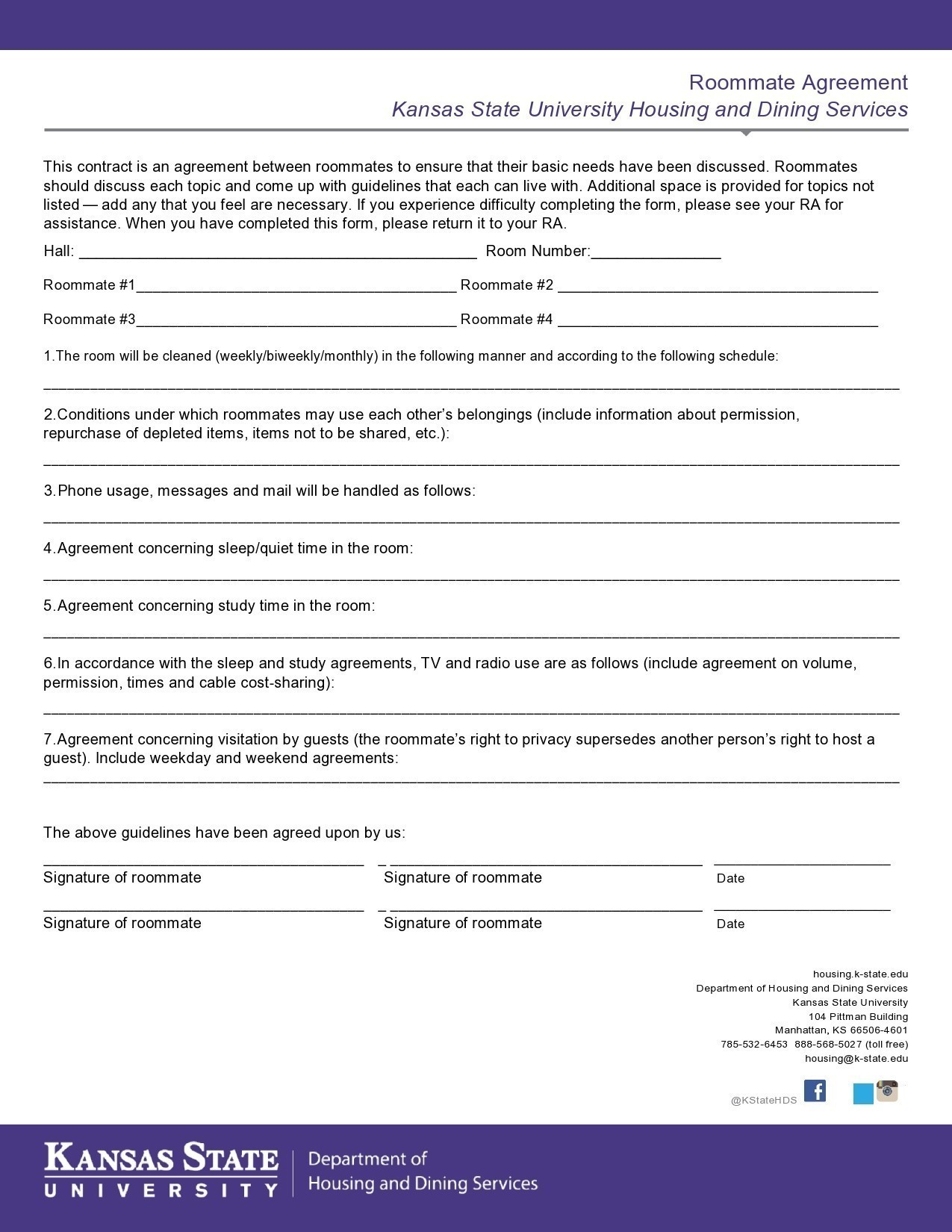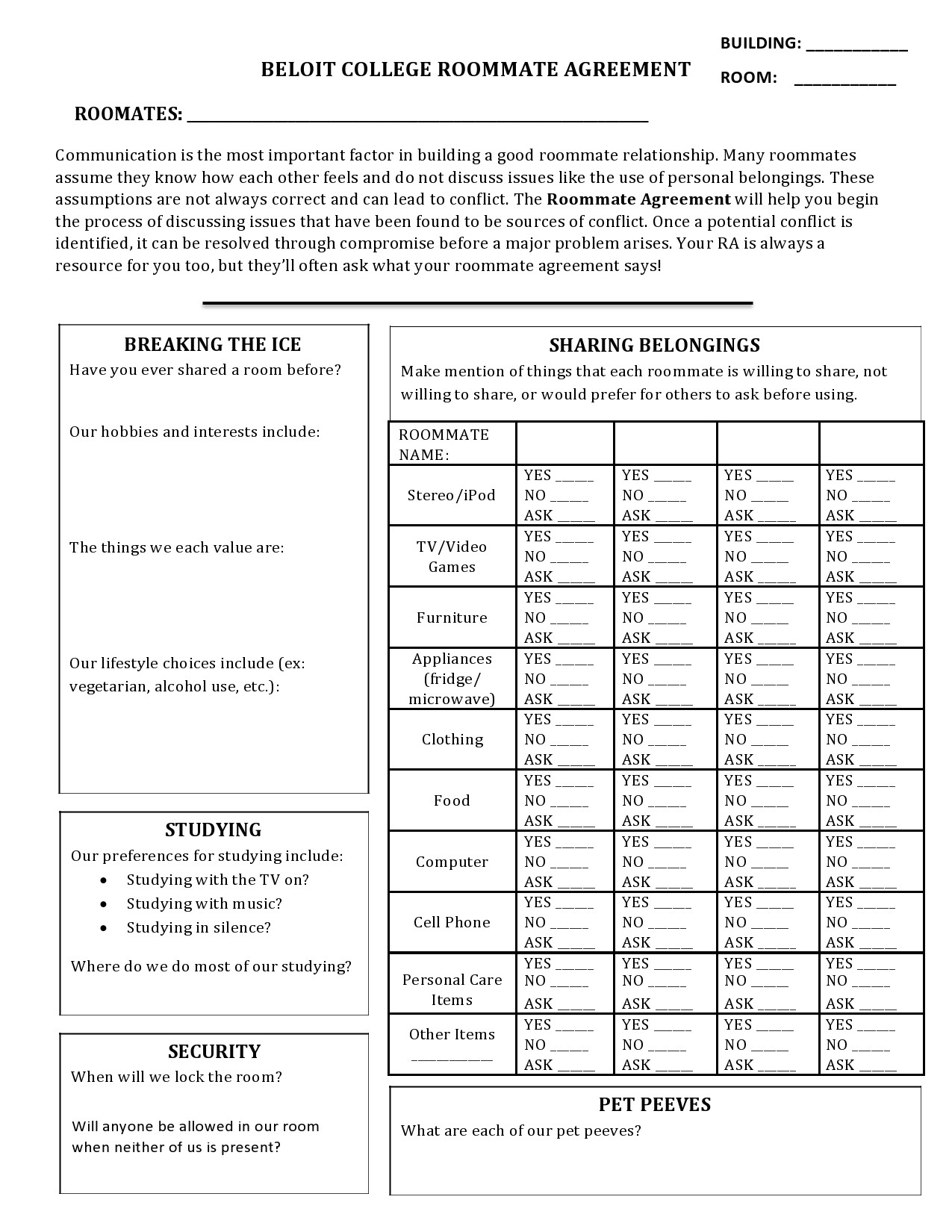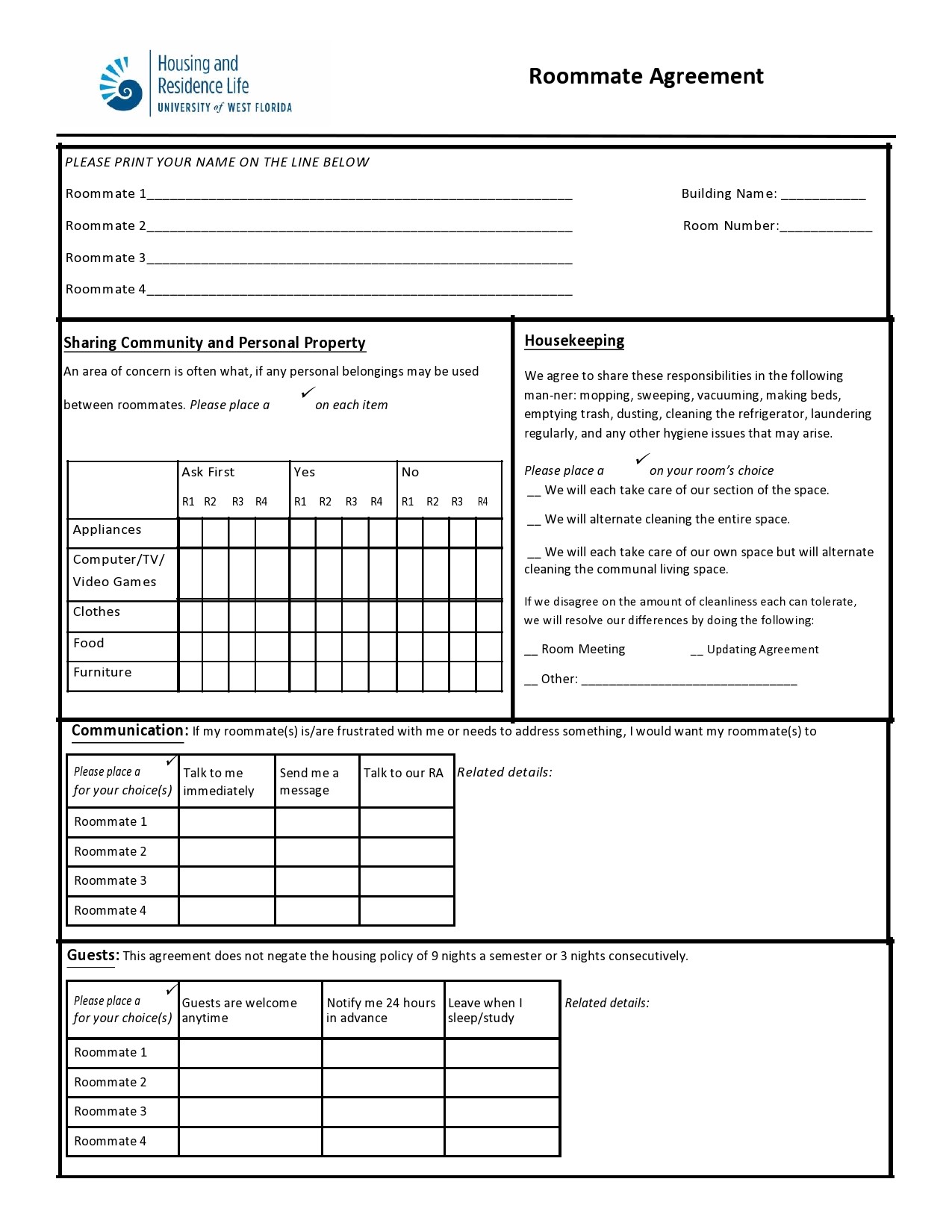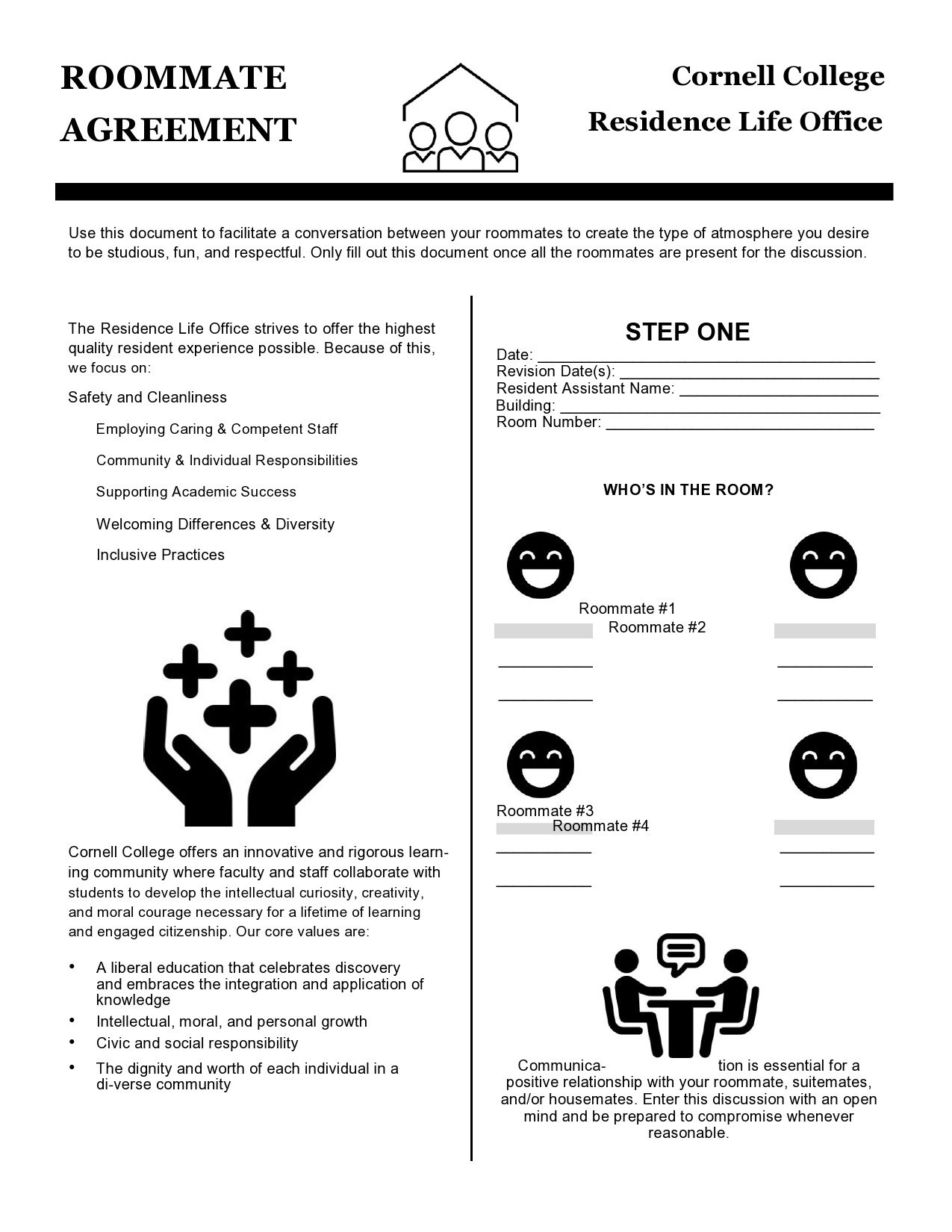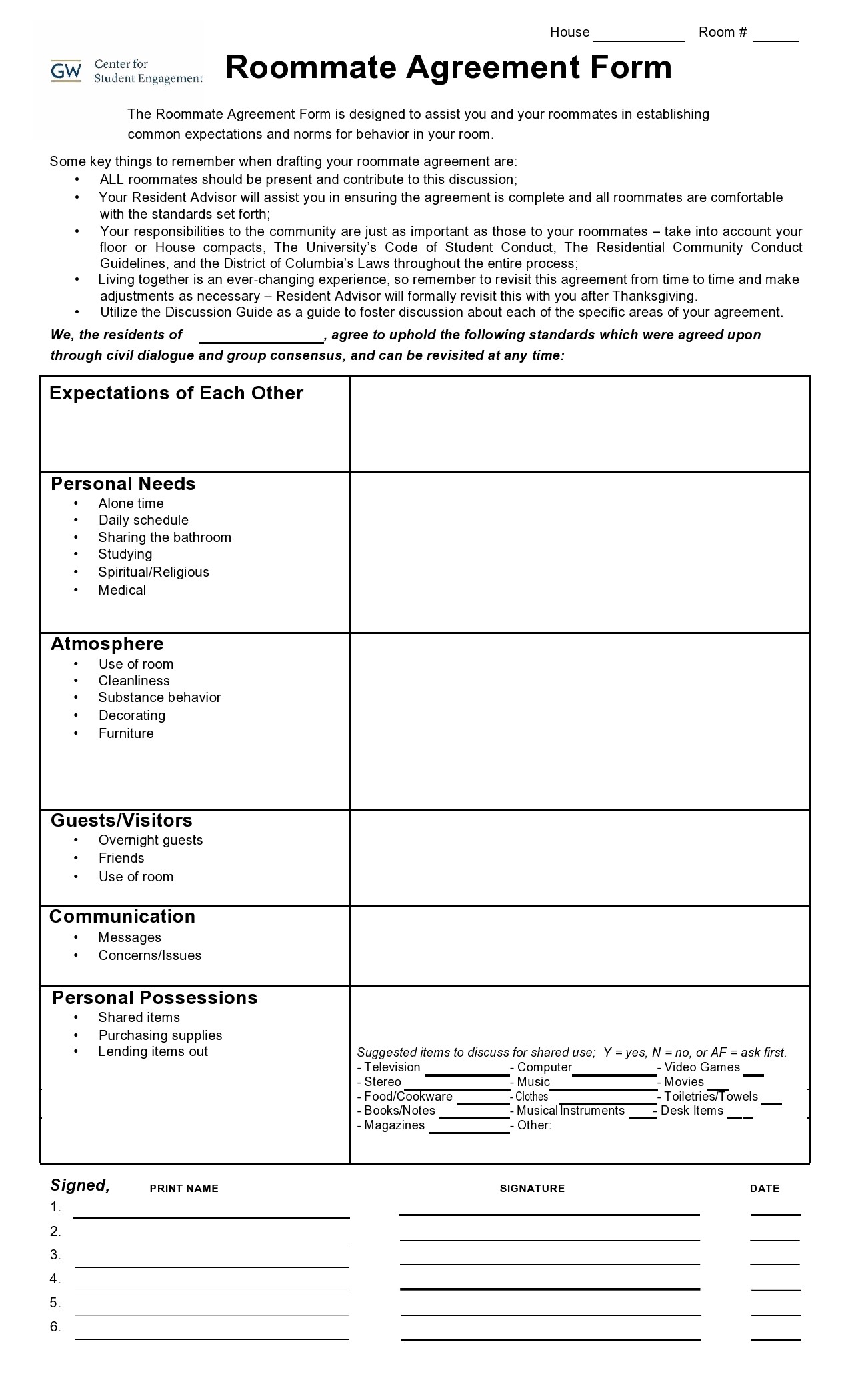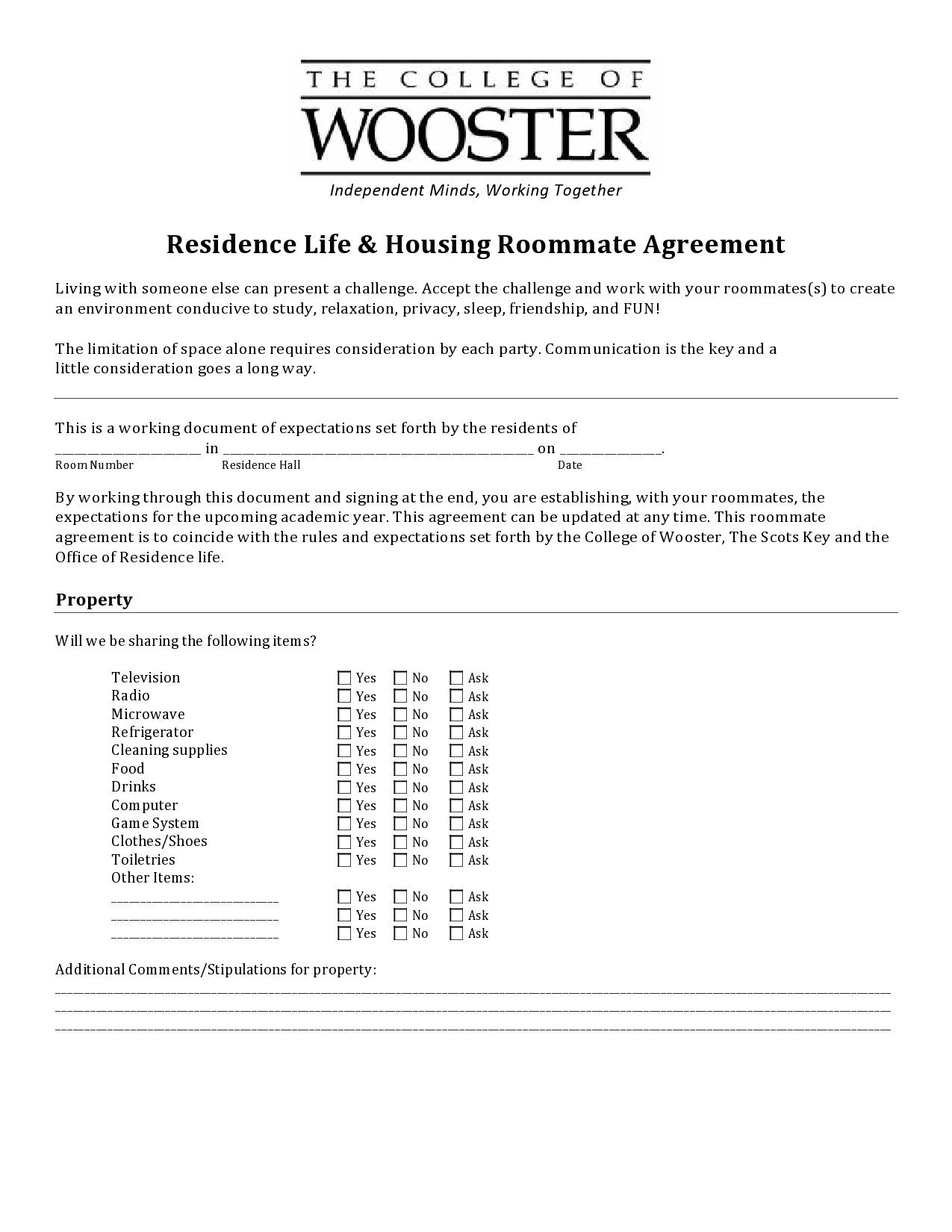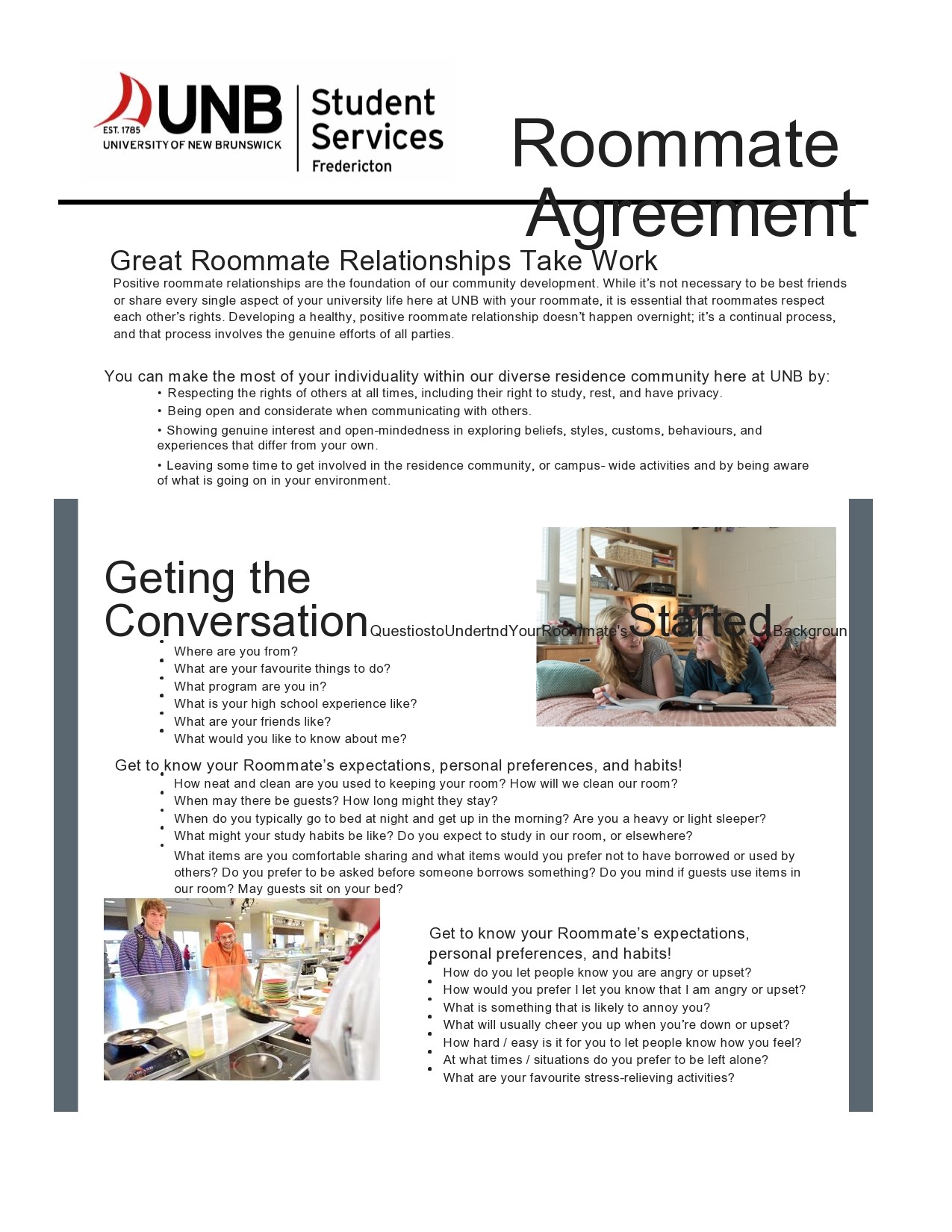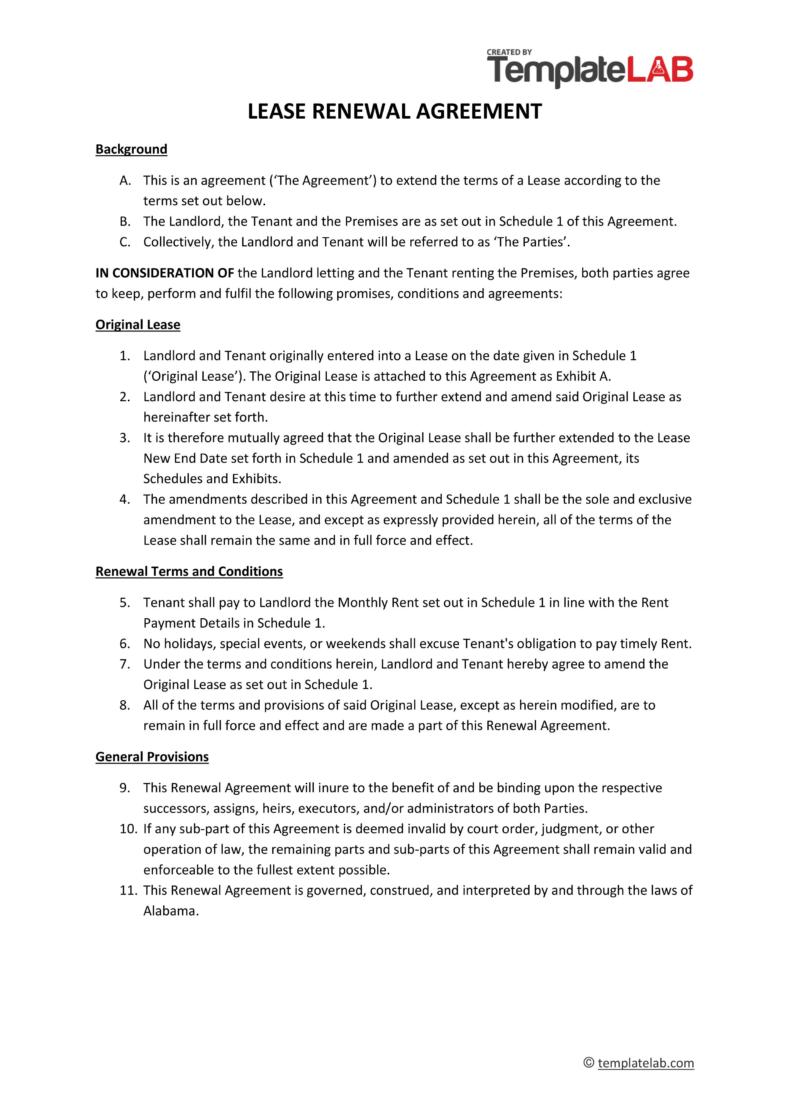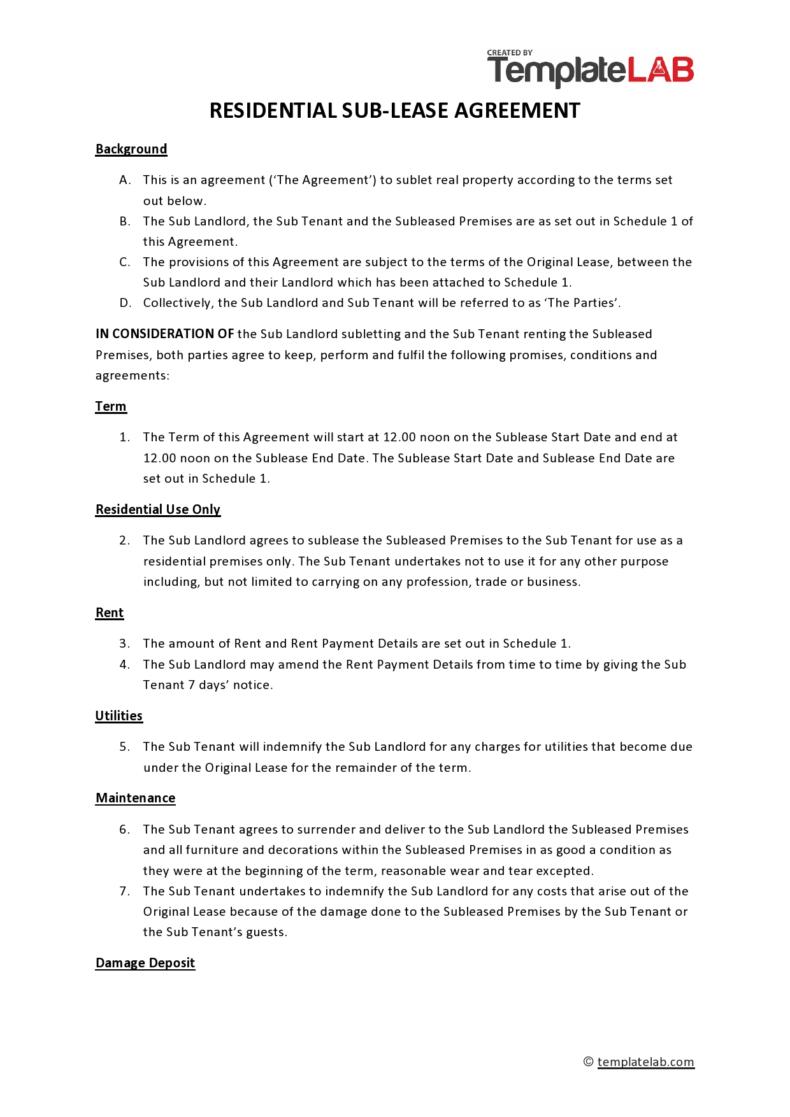The roommate agreement form helps to clarify everyone’s responsibilities toward the rental property in question or towards each other. This is not the same as a lease agreement, and typically one of the parties who is involved in the roommate agreement will be the person who is actually leasing the property from the landlord. This agreement is important to make sure that the landlord’s requirements are met by all of the roommates, even though only one of them has to answer for what happens on the property every month.
Table of Contents
- 1 Roommate Agreement Templates
- 2 What is the purpose of a roommate agreement?
- 3 Roommate Agreement Forms
- 4 Why should you have a roommate agreement?
- 5 Roommate Agreement Examples
- 6 What do you write in a roommate agreement?
- 7 How do you put a roommate on house rules?
- 8 Roommate Agreement Samples
- 9 How often should a roommate have a guest?
- 10 How to Write a Roommate Agreement
- 11 Roommate Agreements Are Very Beneficial
Roommate Agreement Templates
By State
What is the purpose of a roommate agreement?
As stated above, the purpose of a roommate agreement form Is to ensure that the person who is leasing the property and all of the roommates that are renting rooms at the property are on the same page about the way that the leasing agreement works. While the person who is named on the lease is not actually the landlord of the property, they are the person that the roommates answer to, and they are often the person who can be held responsible if something goes wrong with the property during the lease agreement.
Roommate agreements are technically legally binding, and they can be used to enforce financial responsibilities between roommates as well as behavioural responsibilities toward the property in question. Things like house rules and other kinds of internal considerations between the roommates might not be legally binding, but the financial side of the document, as well as the requirements as laid out by the landlord, are enforceable leak leave if this document exists.
It is still advisable to have house rules in place to make sure that everyone understands their responsibilities during the time that they are living on the property. House rules can actually reflect the landlord’s requirements, and in those cases, they will be legally binding if there is some form of an issue that comes up between roommates.
Roommate Agreement Forms
Why should you have a roommate agreement?
Having a roommate agreement or a roommate agreement checklist in hand is important anytime you have people living with you or not names on the lease while you are named on the lease. There are the following benefits to creating this document to use if you are renting a room in your home or apartment to someone else:
- Prevents disagreements
- Helps clarify rules and responsibilities
- Ensures that landlord requirements are met
- Makes sure that financial considerations are met each month
- Makes it possible to notify roommates that they have to move out
- Indicates which actions can cause someone to be removed from the property
Roommate Agreement Examples
What do you write in a roommate agreement?
A roommate agreement will need to include all the details that are necessary to make sure that everyone who lives in the house understands what is expected of them. When there is a lack of clarity about the rules that need to be followed, there can be issues with non-payment of rent as well as arguing over who does which things around the property.
You should always be sure that the original lease agreement or rental agreement is being followed as well. Just because you have moved people into your rental does not mean that they are not impacted by the rules and regulations as set out by the owner of the property. This is a common problem with younger renters who are not experienced in the rental process, but older people can have issues with renters who do not want to follow the landlord’s rules.
The clearer your roommate agreement is, the better off you will be as the person who is allowing other people to live with them. House rules and other kinds of guidance can make all the difference when it comes to keeping everyone who is living together happily.
How do you put a roommate on house rules?
House rules should be required for any living arrangement, even between friends. The rules that you define for the roommates who live with you will help everyone to be on the same page and make sure that there are few disagreements and that the lease is not somehow broken by someone living with you. Putting house rules into effect can be hard if you do not start out with these rules in place, but you will need to make it clear that the rules have benefits for everyone involved in the living situation.
There are some ways to make your rules easy to understand and simple to follow that you will want to observe. Be sure that you keep these suggestions in mind when you are making a roommate agreement that includes house rules:
- Be clear and concise
- Post the rules somewhere that everyone can see them
- Do not call anyone out for specific behaviors and just state the rules that everyone must follow
- Unique responsibilities can be done on a cyclic calendar to make things fair
- Rent payments and other financial considerations must be paid on time without exception
- Explain what is and what is not allowed with regard to visitors or parties
- Be sure that your landlord’s rules are followed
Roommate Agreement Samples
How often should a roommate have a guest?
The frequency with which roommates can have guests or can throw parties should be discussed before someone moves in. This is one of the situations that can lead to major issues between roommates. This issue can easily be avoided by everyone sitting down and discussing how the rules will work. Bringing other people into a shared living space can cause a lot of strain on others who reside in the home, but you can make sure that everyone is clear in advance about the rules.
Roommates might need to be limited to certain days of the week when it comes to social visits, and things like boyfriends and girlfriends might need to be discussed in advance. In some cases, the size of the living space might limit what kinds of activities can be done in the apartment or home. The landlord might also have rules about visitors or parties being thrown on the property, and these things should be discussed between roommates before anyone moves into the property.
How to Write a Roommate Agreement
- Name the Parties. Both the roommate and the person who holds the lease with the landlord need to be named correctly at the top of this document. Use full legal name is When indicating the people who are involved in the roommate agreement, and make sure that you put at least a phone number under each name so that it is simple to contact one another as needed. While it might seem unlikely that you would need to refer to the contact information in the roommate agreement, you could be surprised at how simple it is to lose someone’s phone number. If there are already other roommates living in the rental property and there is a new roommate that is going to be added to the living situation, everyone will need to sign a new roommate agreement. Be sure that you’re not exceeding the allowed number of people who can reside in the property that you were renting because this could cause you to lose your ability to lease the property, or your landlord could remove you from the property.
- Expenses. The shared expenses that are involved in the roommate agreement or one of the key reasons that this agreement exists. Make sure that you include a list that indicates what each of the costs is for renting and living at the property, and make sure that everyone is clear about their part of the financials for the rental. You can choose to split rent and all of the other costs evenly, or there might be some expenses that only some of the roommates pay for. No matter what the expense breakdown is and no matter who is responsible for which part of the cost of living at the property, all of this information is to be clear in the roommate agreement. You need to remember that if you were the person whose name is on the lease, you are the person who is responsible if something happens between you and your roommates that leads to the landlord being upset with all of you. Non-payment of rent or non-payment of fees and other costs associated with living at a property can be one of the key reasons that you lose your lease.
- Shared Spaces. The use of common spaces may need to be clearly defined in your rental agreement between you and your roommates. If there is limited space to be shared in areas like the living room or the backyard, you might need to define who is allowed to bring what into the space and what kinds of activities can happen in this part of the property. So long as everyone has their own room, you might not have to define what happens in shared bedroom spaces, but if this is not the case, you also need to explain the shared use of living spaces outside of common areas.
- Parties and Guests. Parties and guests can often be a point of major contention between roommates when there are no clear rules about these activities and people. At the end of the day, your rules about parties and guests may be partially dictated by the requirements of the landlord to do with noise and parking. You may also have your own preferences about the way that you want your shared space to be used for having fun, and you might want to limit these kinds of activities and any way that you prefer. Make sure that you discuss relationships with girlfriends and boyfriends or other parties who might be around consistently and who could cause problems for the lease.
- Pets. Many rental properties do not allow pets, so you need to discuss this limitation with any potential roommate who has a pet. It is never worth it to risk breaking your lease or having your landlord kick you out because someone has a cat or a dog that you didn’t know about before they agreed to rent a room from you.
- Chores. If you want to be sure that chores get done, you can also include a section in your roommate agreement that dictates who takes care of which chores and when. This could be better handled as a simple set of house rules that are not included in the roommate agreement, but that is up to you.
- Moving Out. You need to include information about how roommates can ask to move out or circumstances that could lead to them being forced to move out ahead of the stated end date of their time living with you. Being clear about this section of the roommate agreement can save you a lot of headaches later if you run into problems with the people you have chosen to live with.
Roommate Agreements Are Very Beneficial
Roommate agreements are very beneficial for all of the parties who live together. Being able to inform your roommates about the rules and the limitations of the use of the property that you’re renting can be very important to maintain your relationship with your landlord and keep your lease in good standing. Beyond requirements that are set forth by the landlord, you will have your own limitations that you will probably want your new roommates to follow. When everyone is clear about the details of the expected behaviors that are part of the agreement for living in a home or an apartment, you can make sure that there is no conflict between parties that cannot be resolved.

